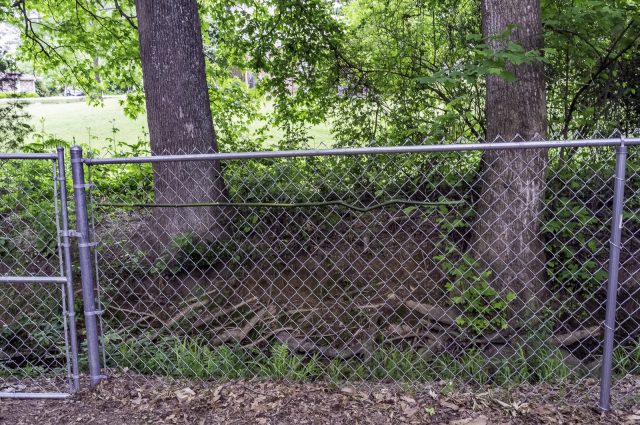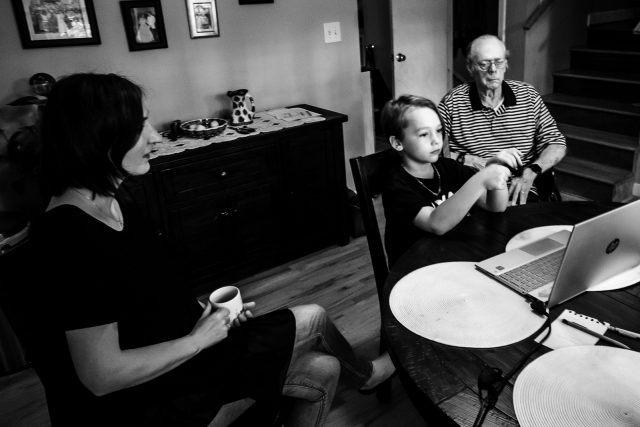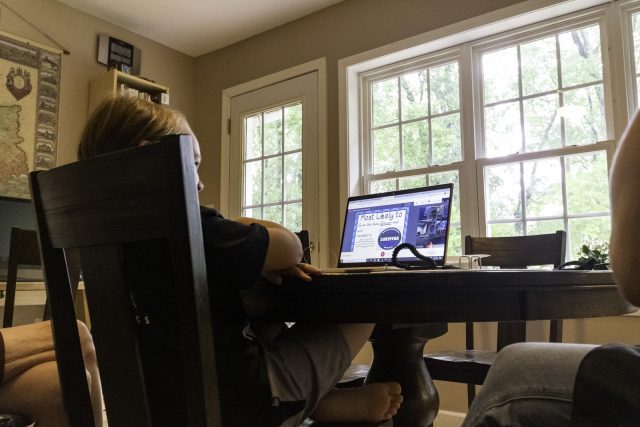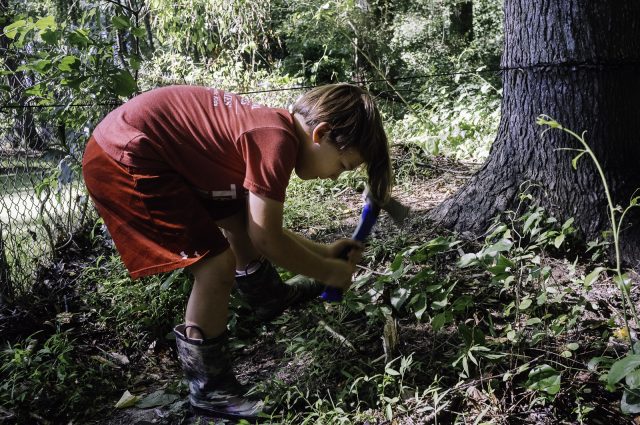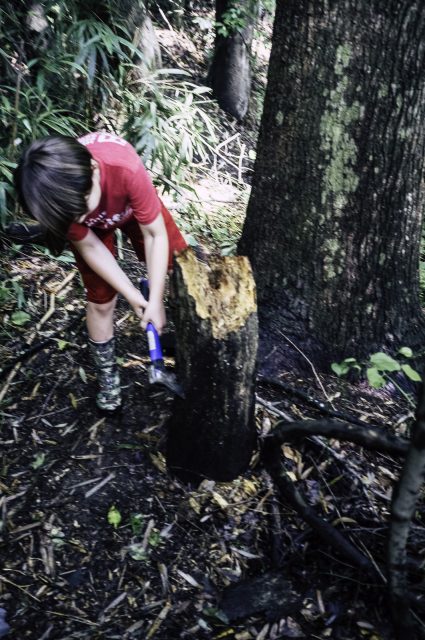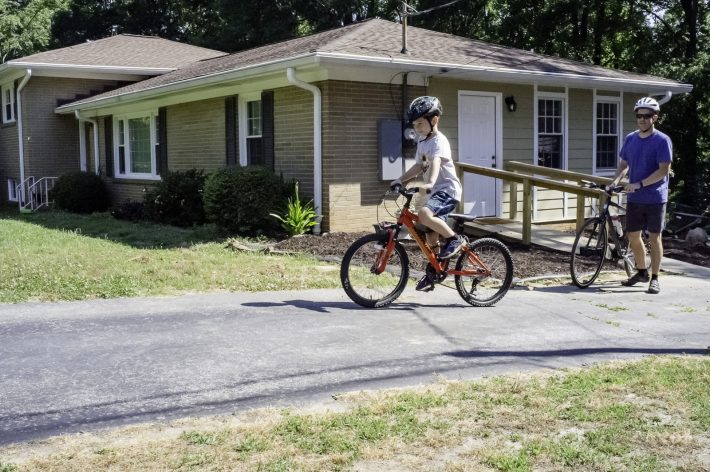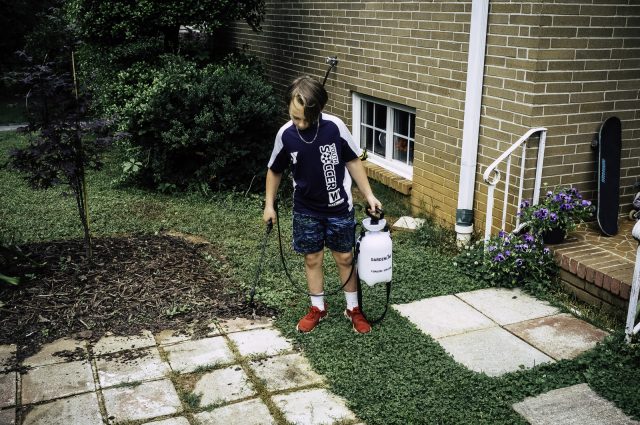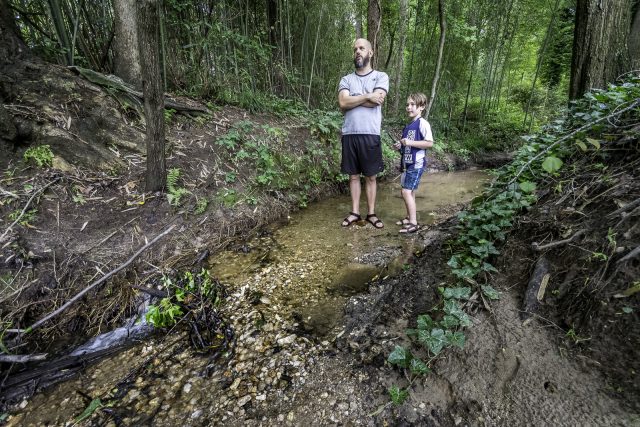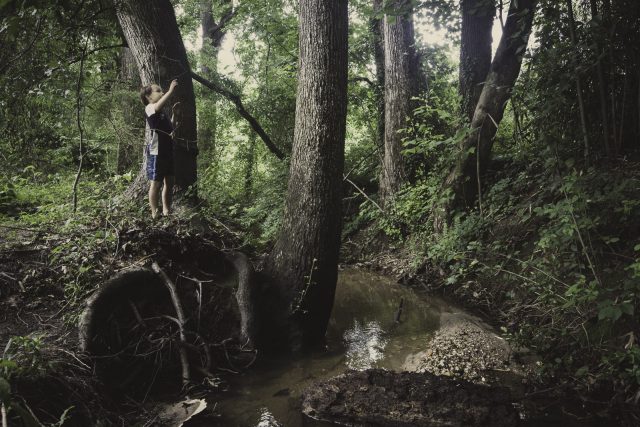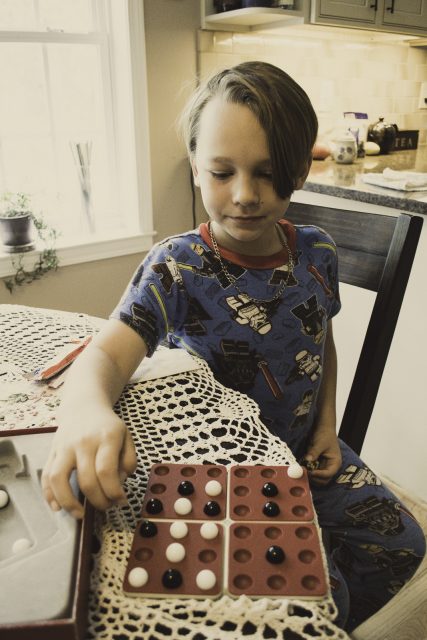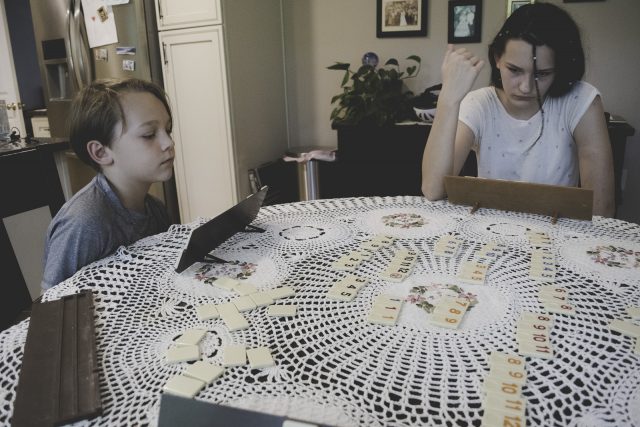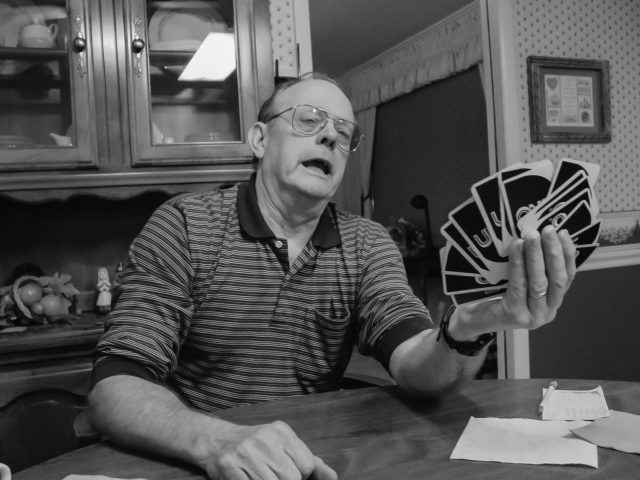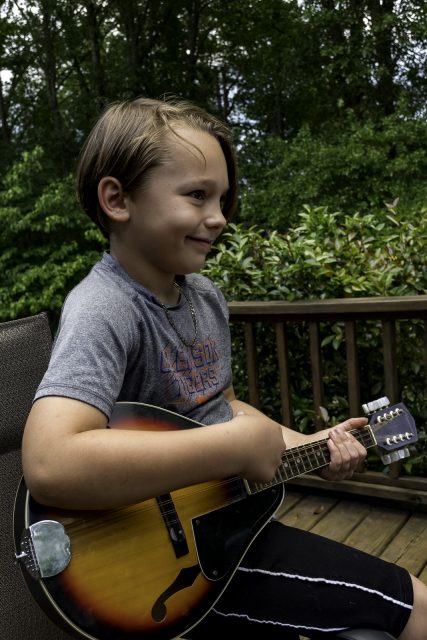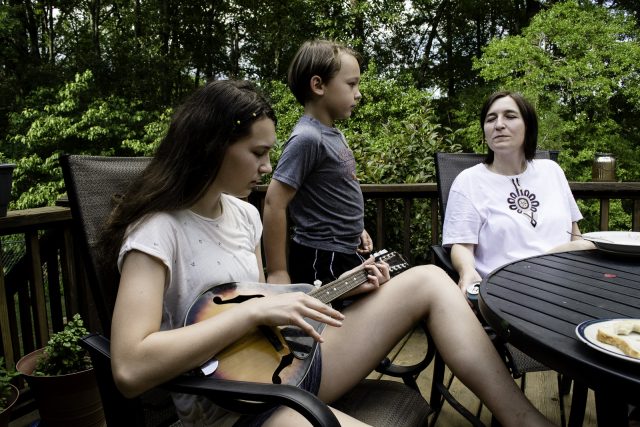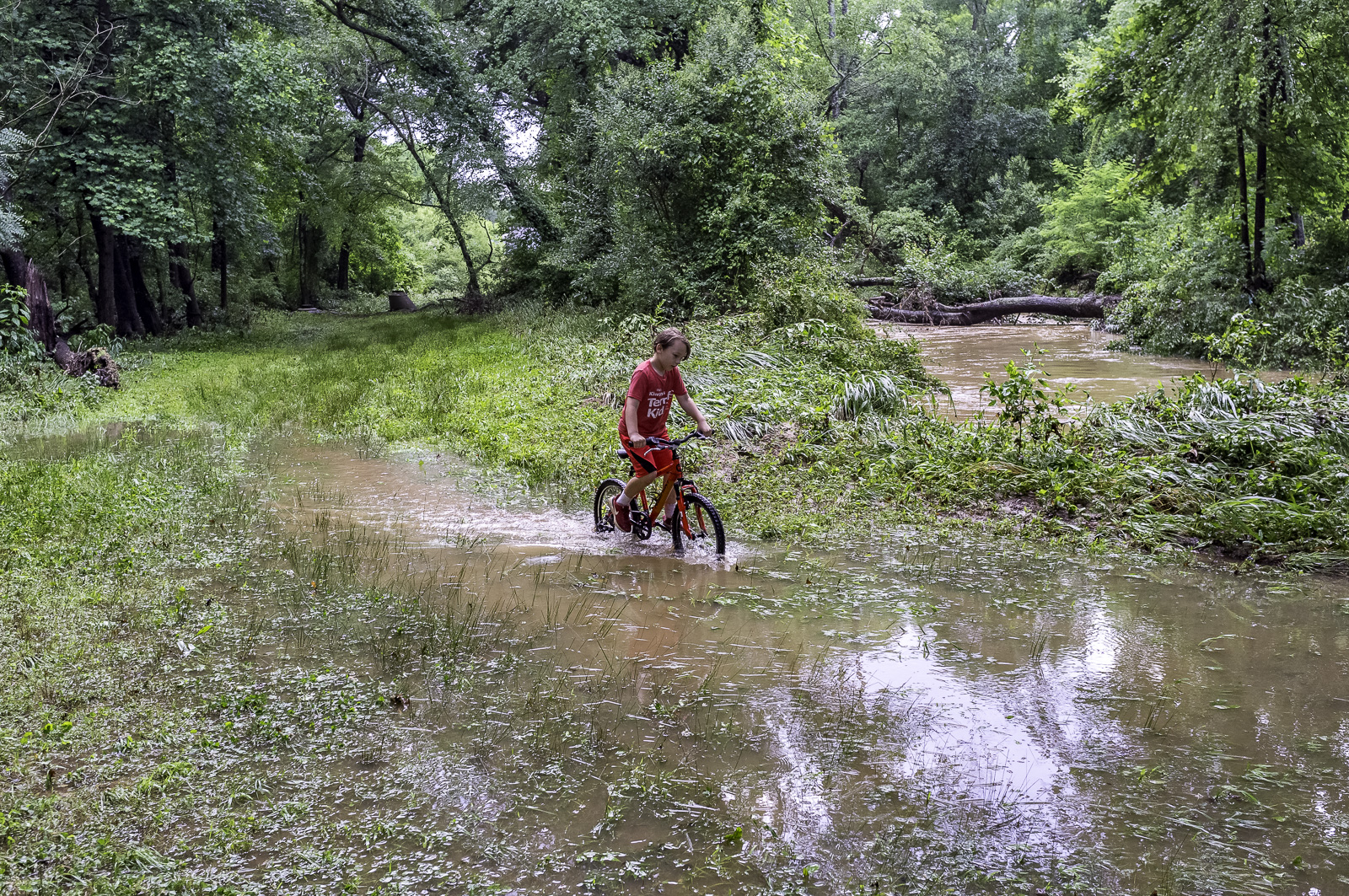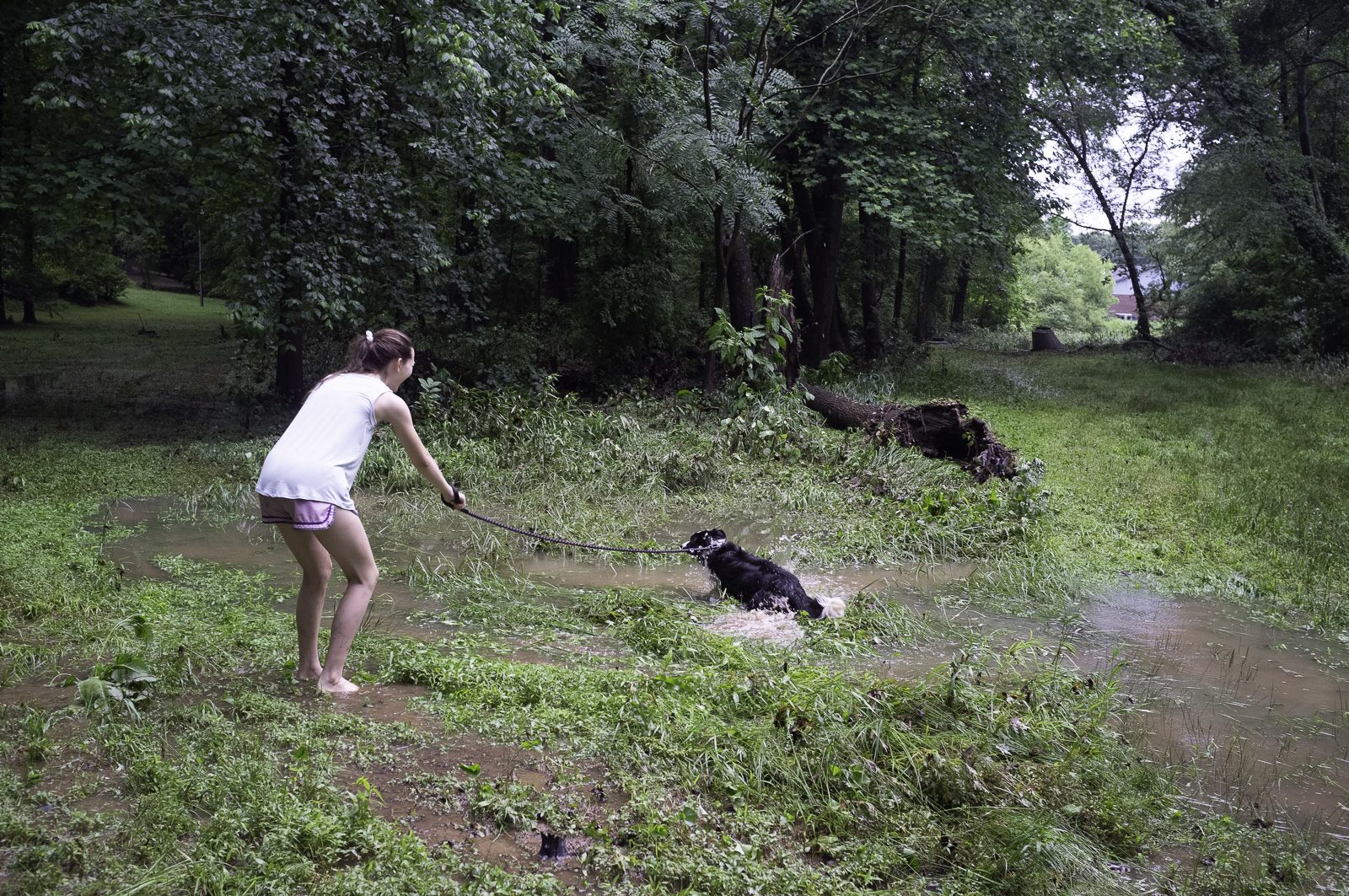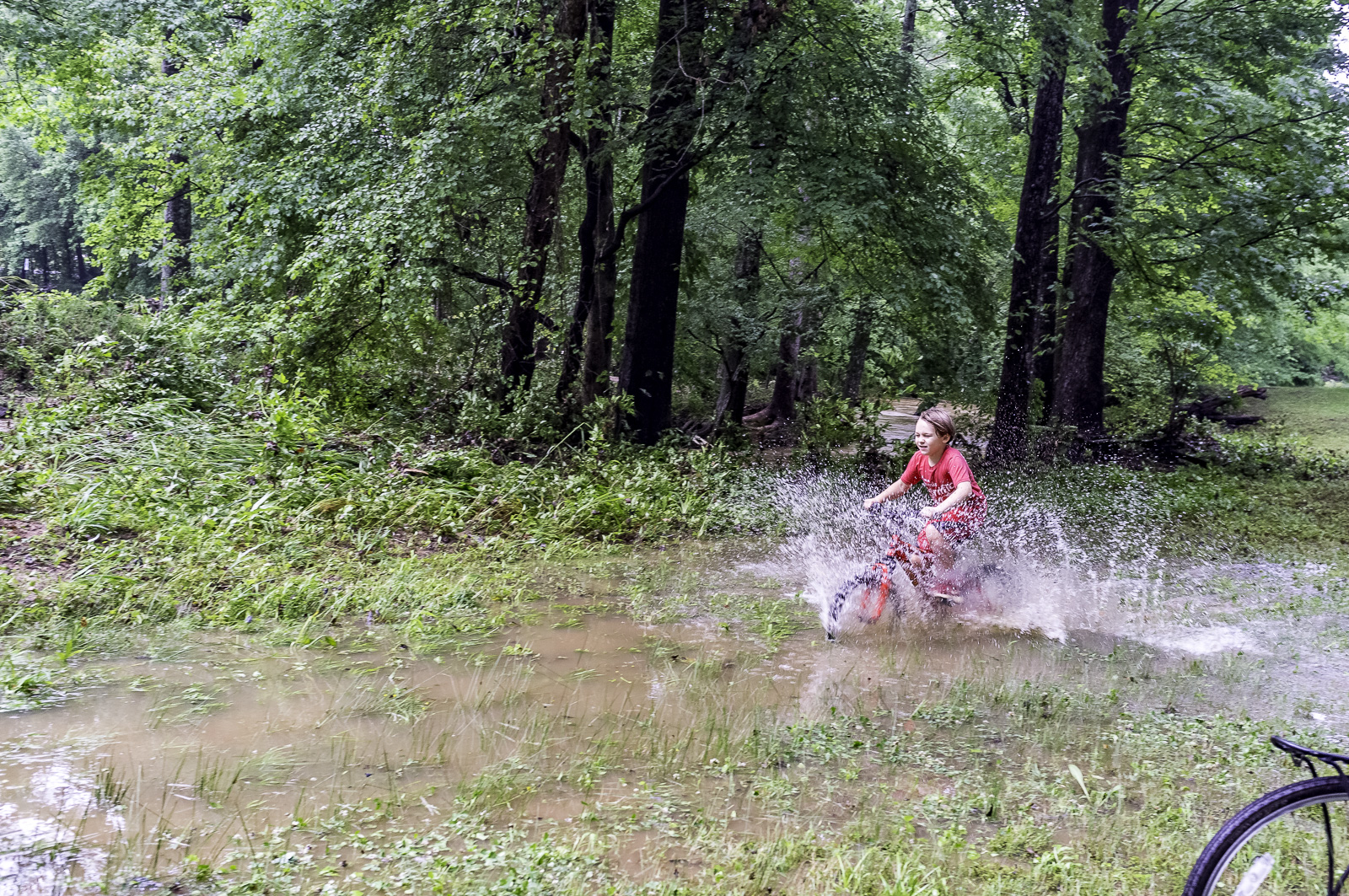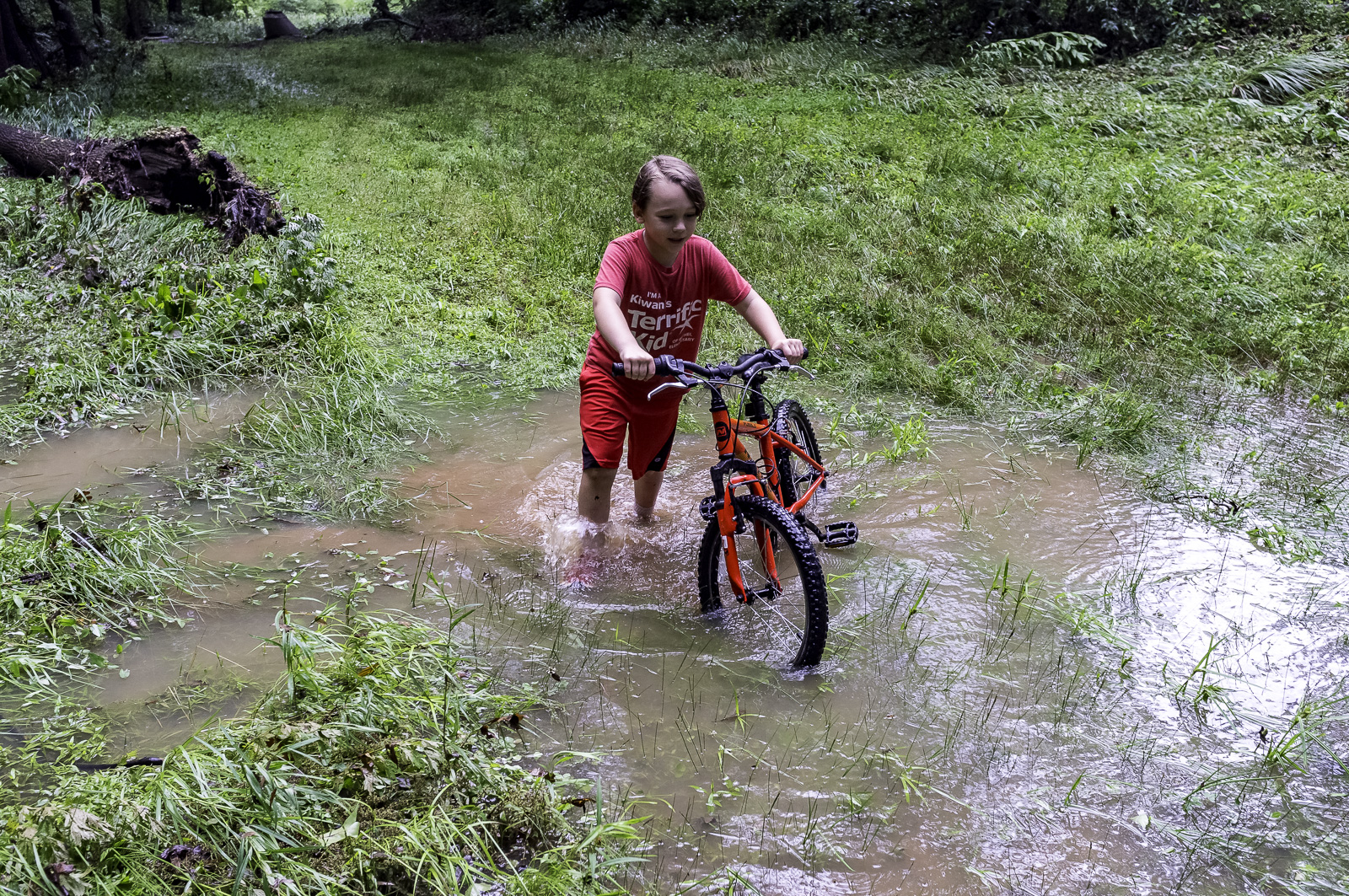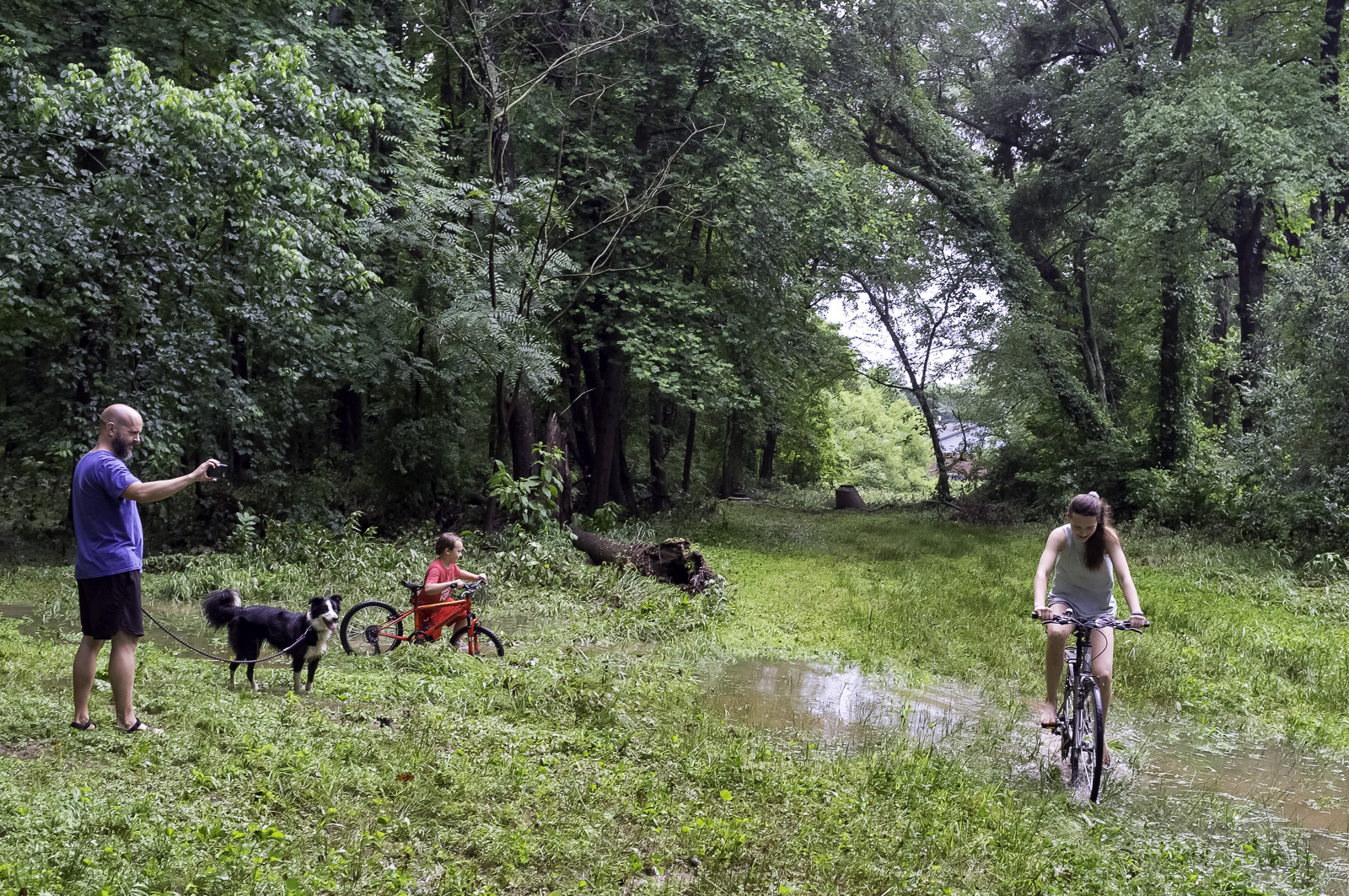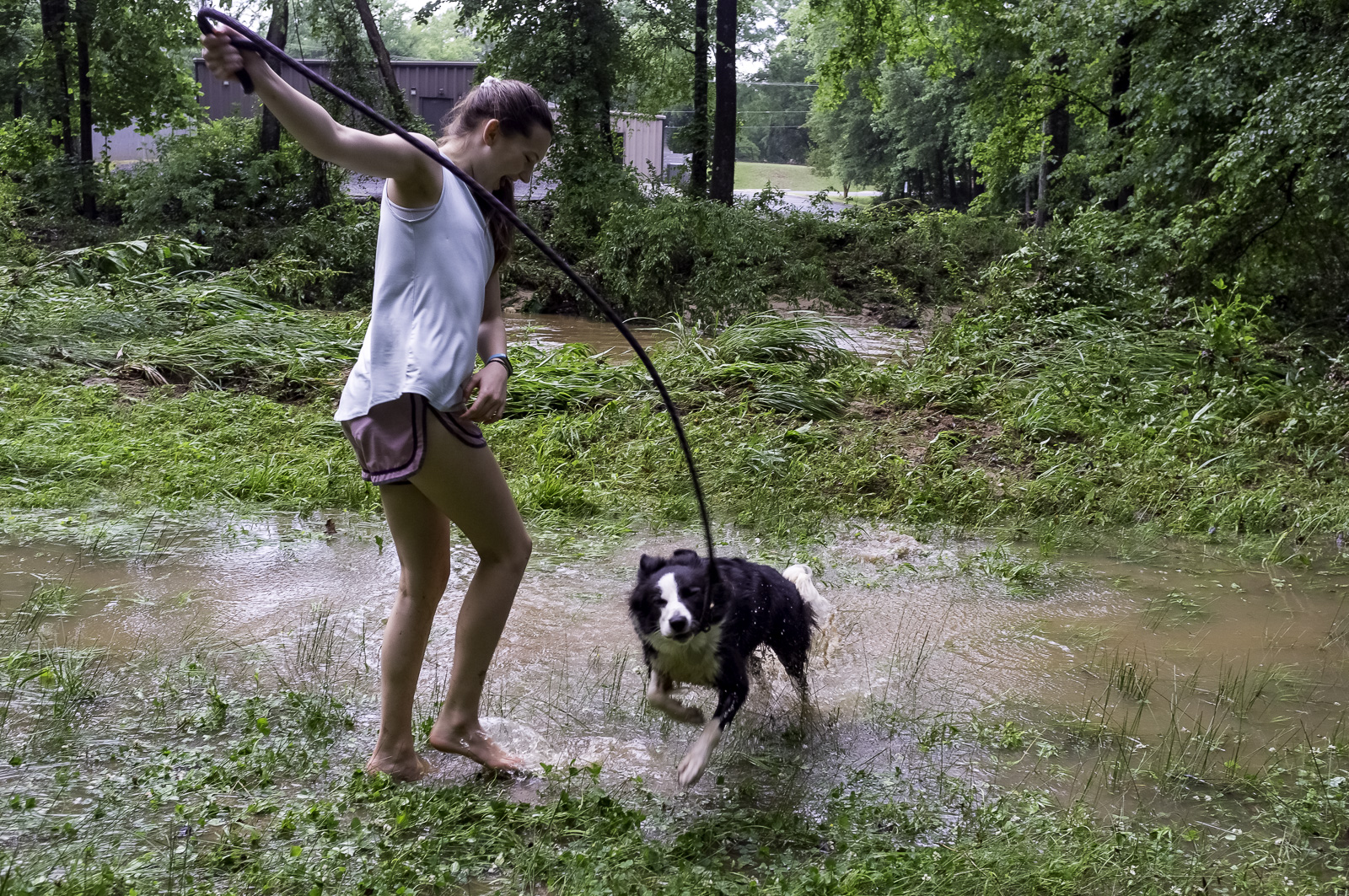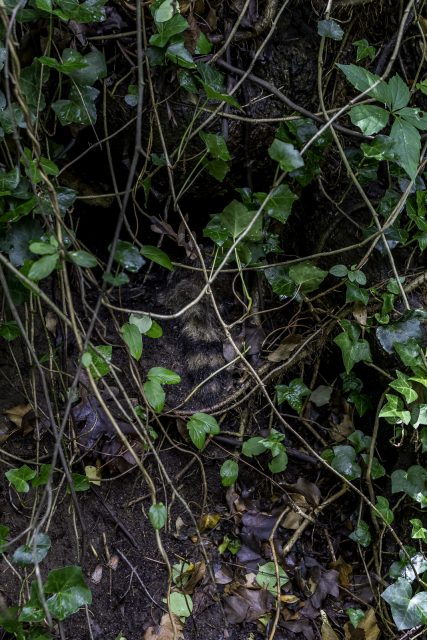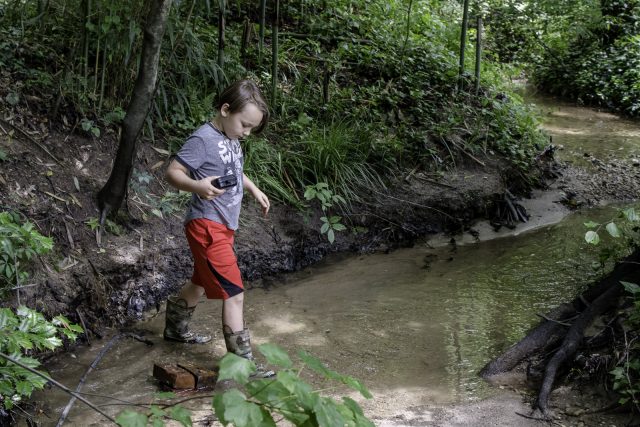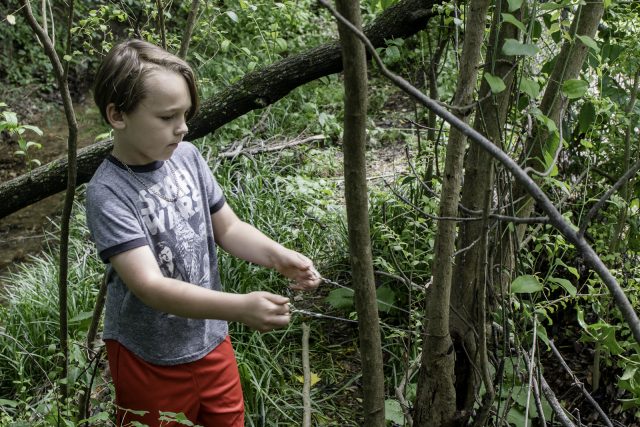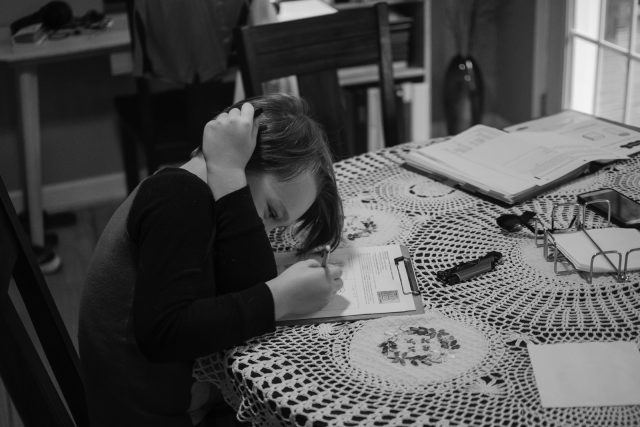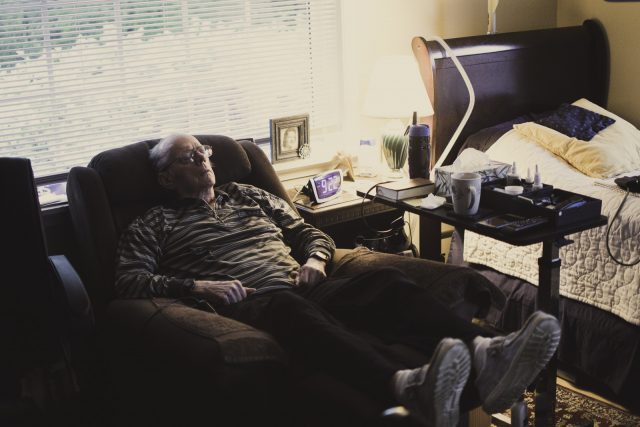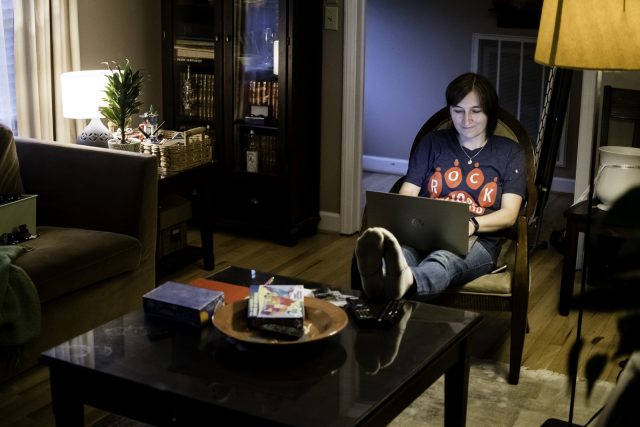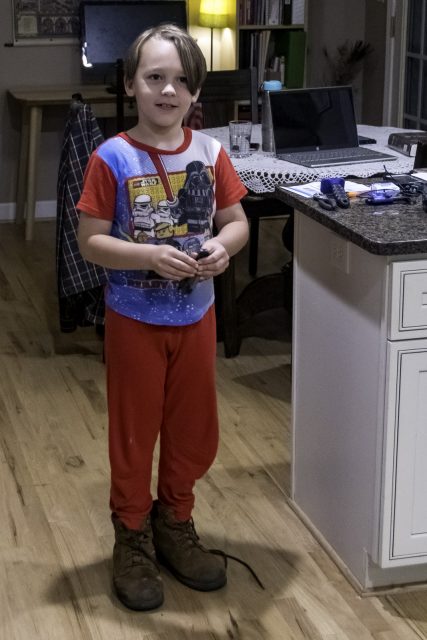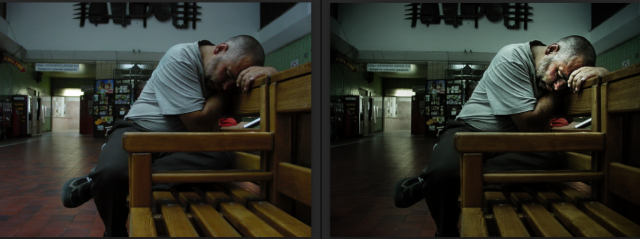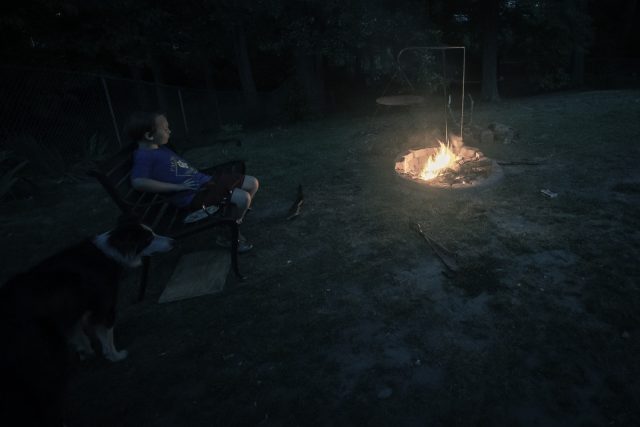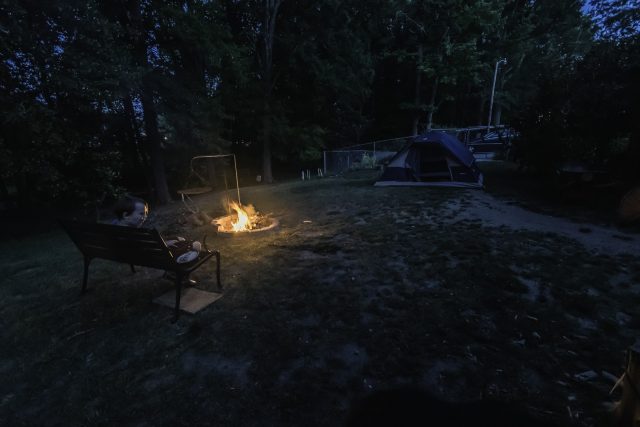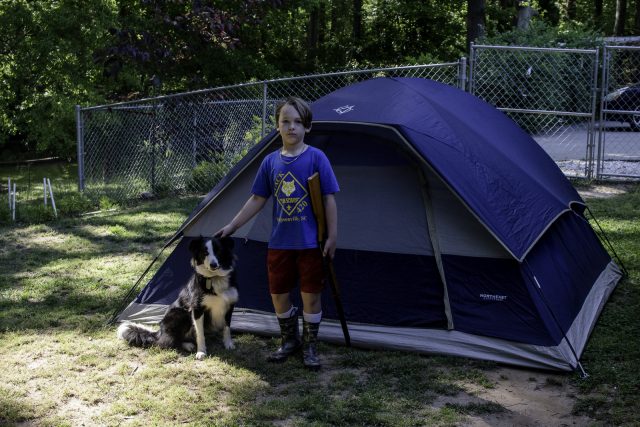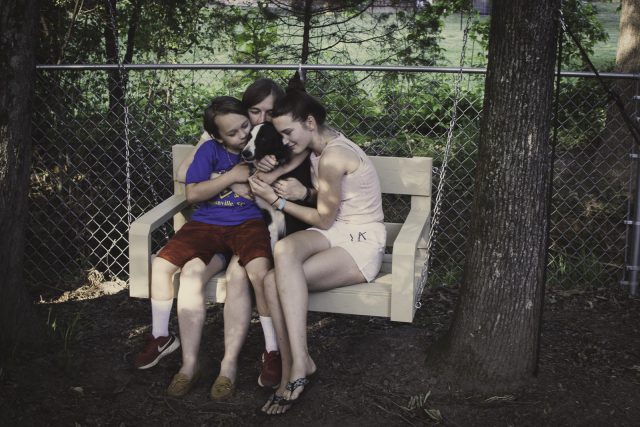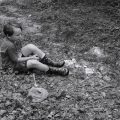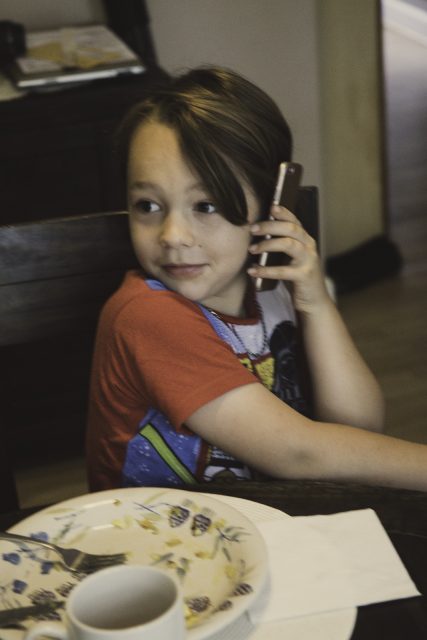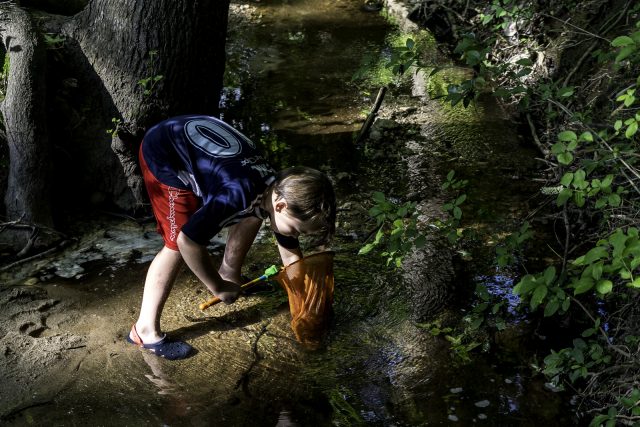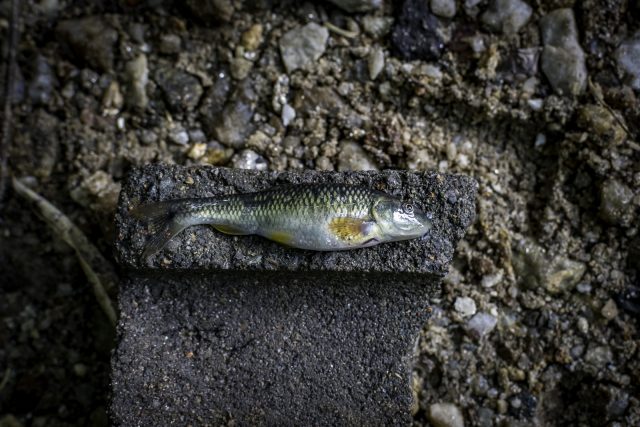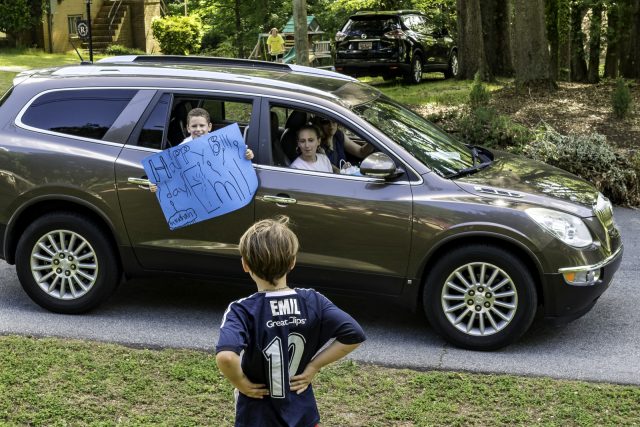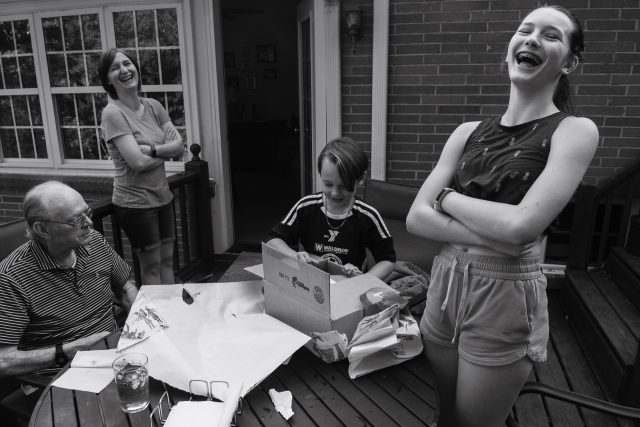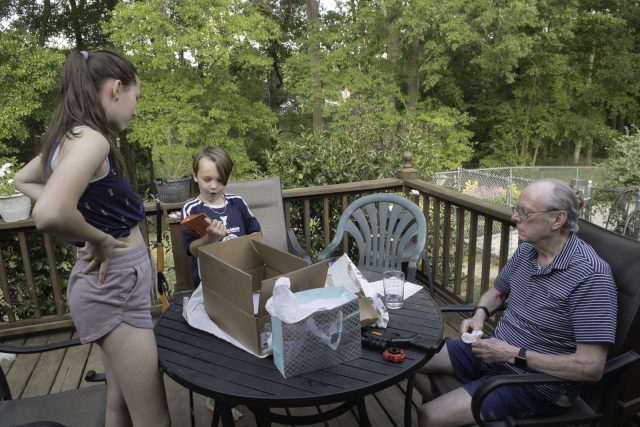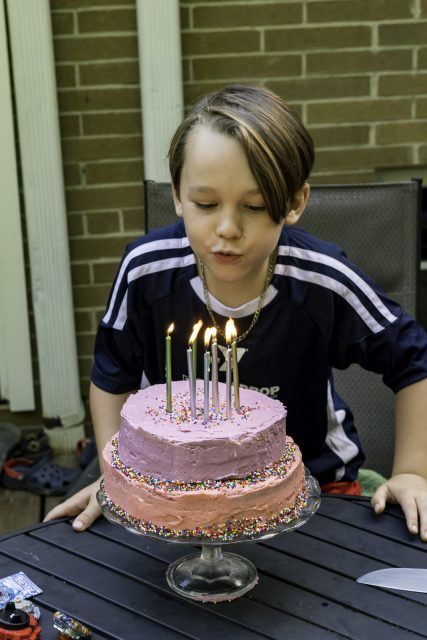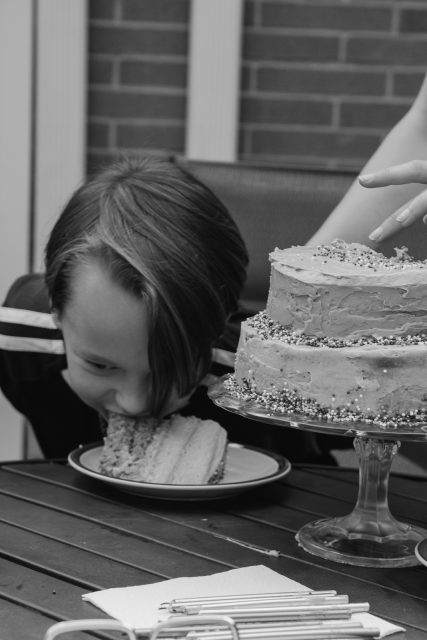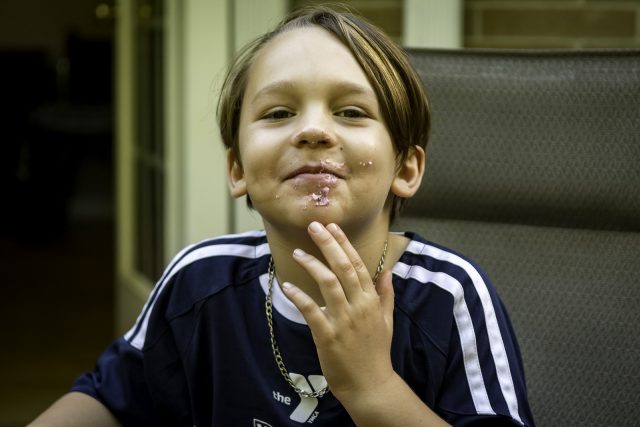This content is private.
Month: May 2020
Day 77: First Day in Conestee in Rainbows
First Day in Conestee
We’ve been waiting for our favorite park to open for weeks now. It seemed to us that going for a walk in the park should be something that lends itself rather naturally to social distancing. Certainly, you have to be aware of where everyone is and perhaps not go at the pace you would normally walk, but those are small concerns that mature people can keep in mind and in action relatively easily. But the city kept the parks closed.
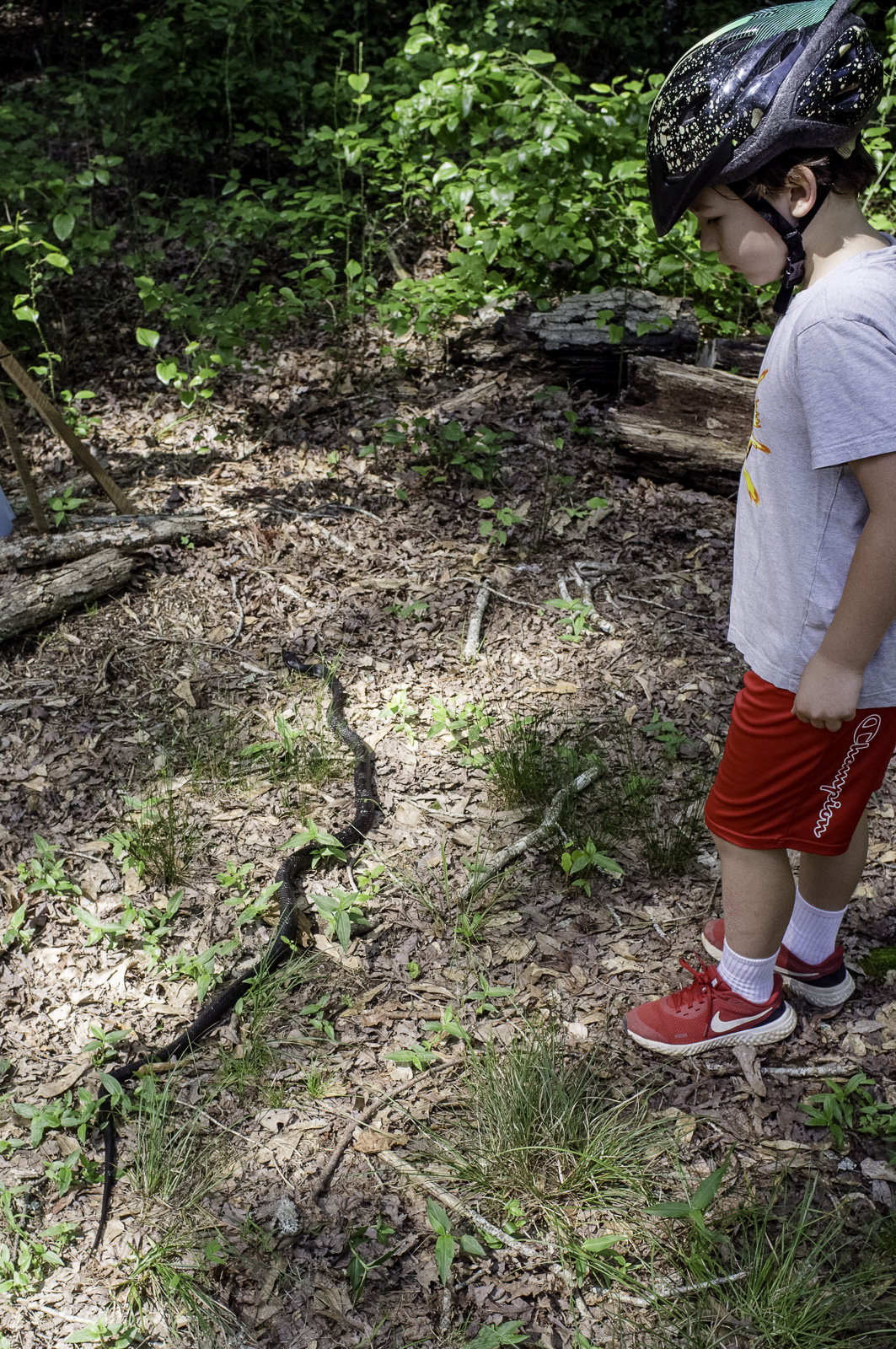
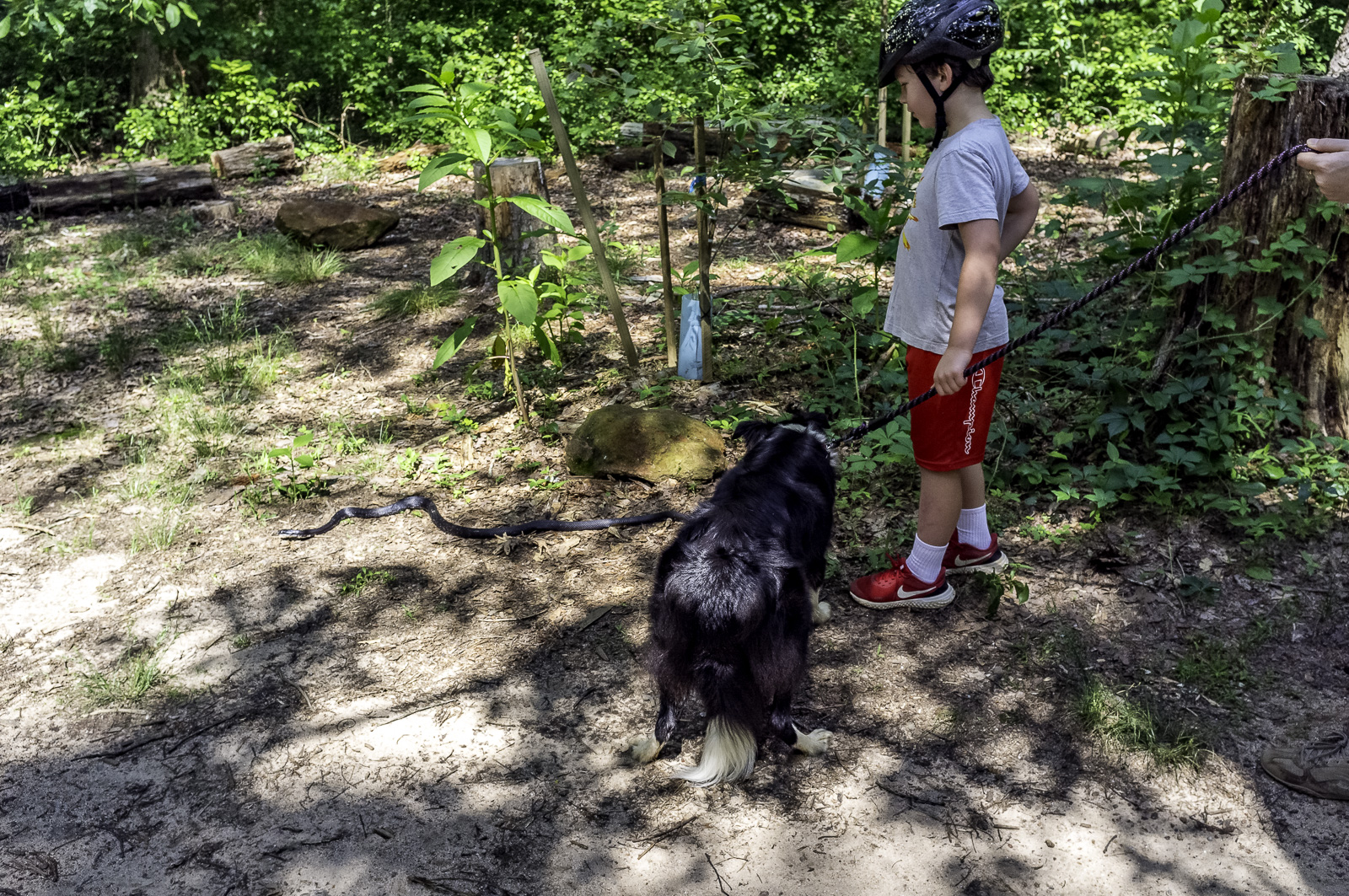

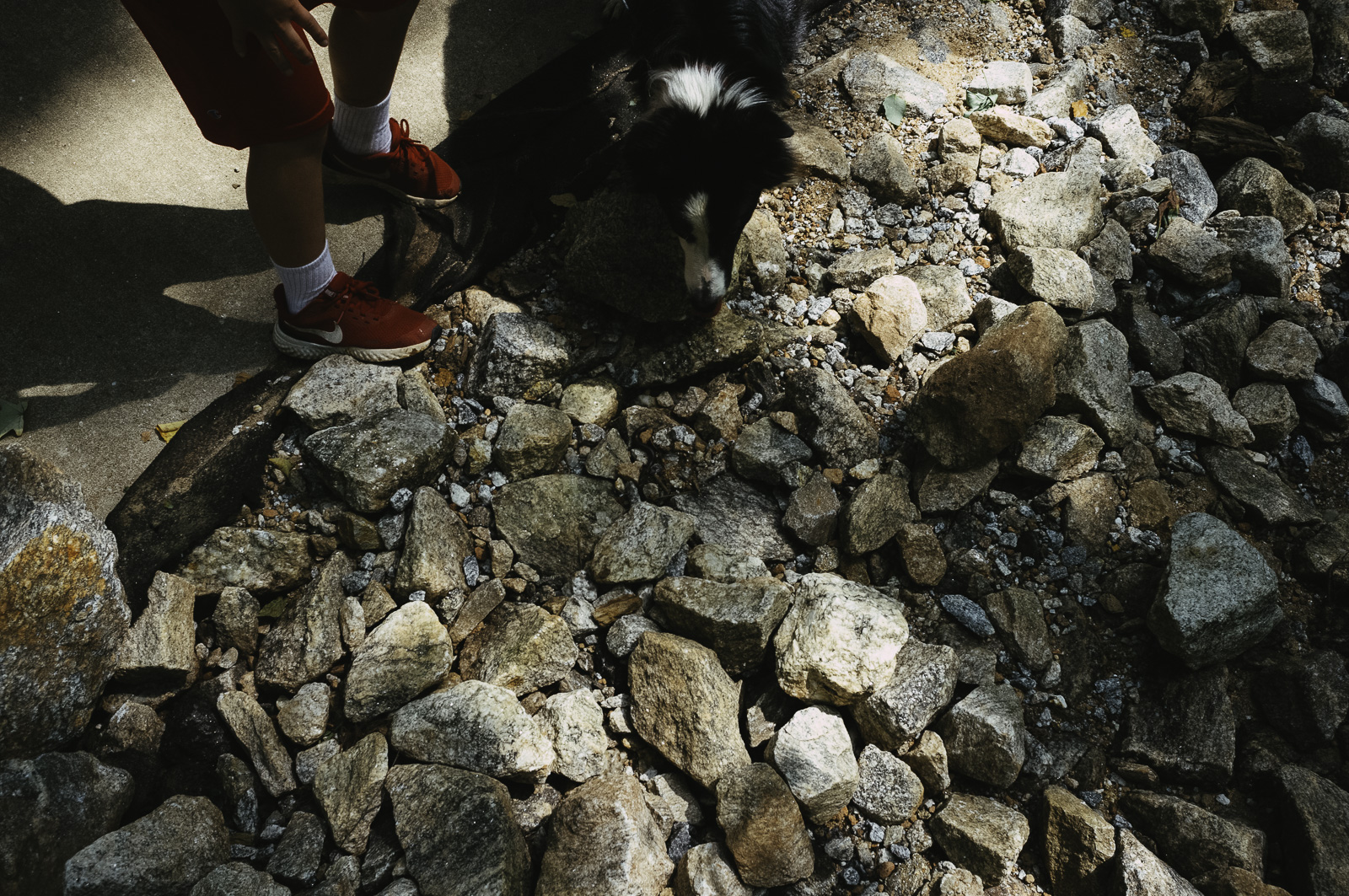
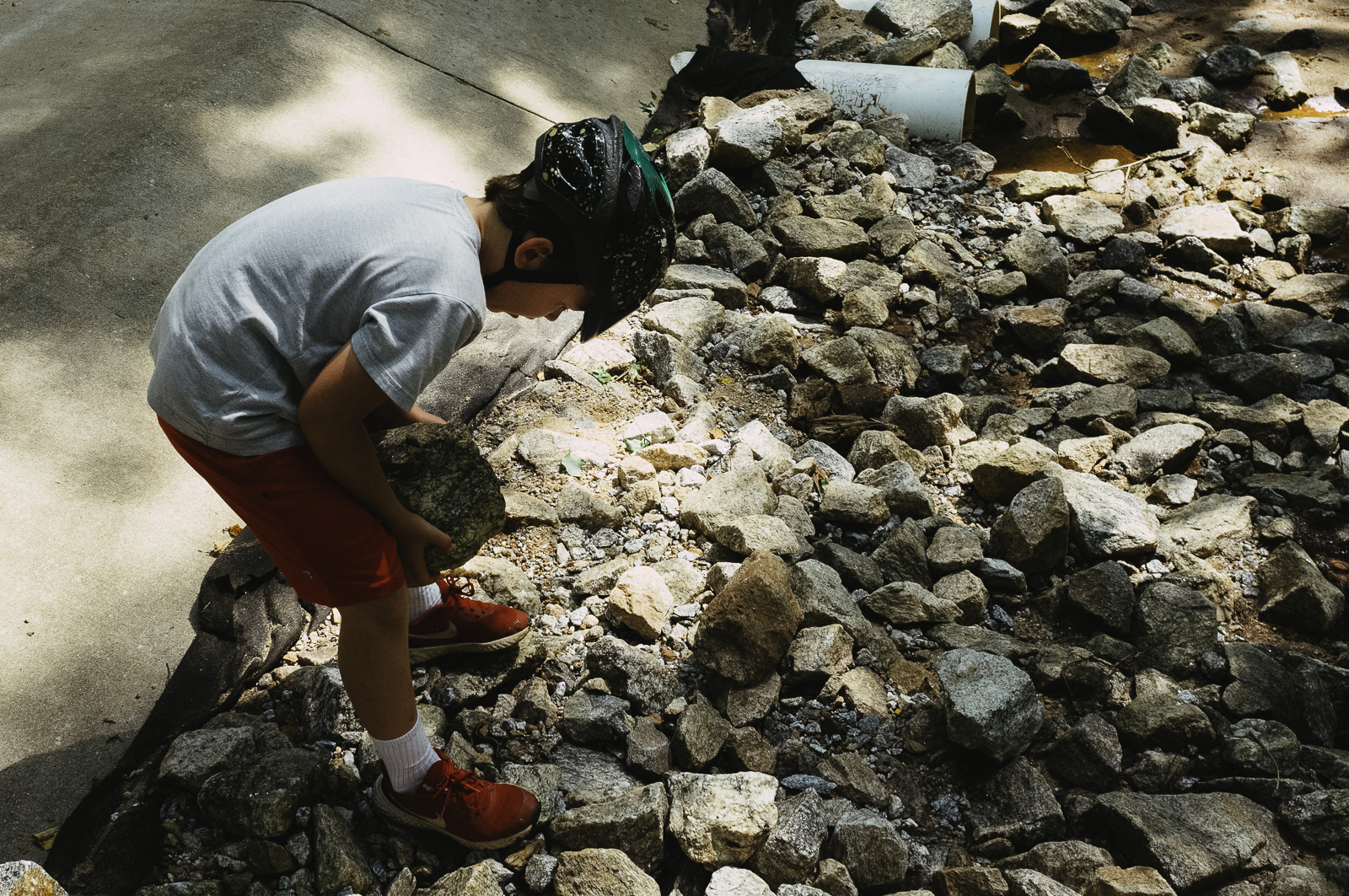
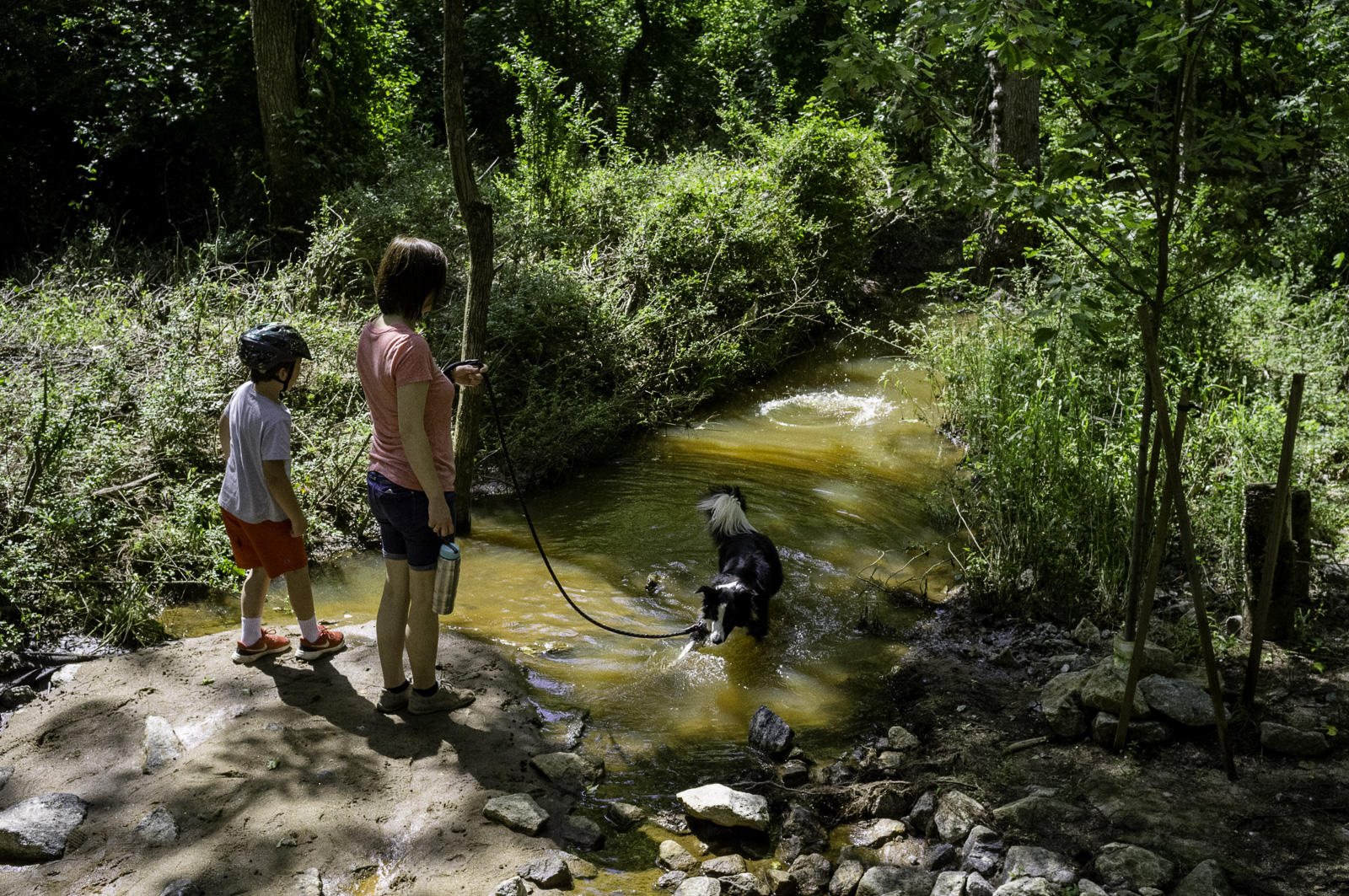



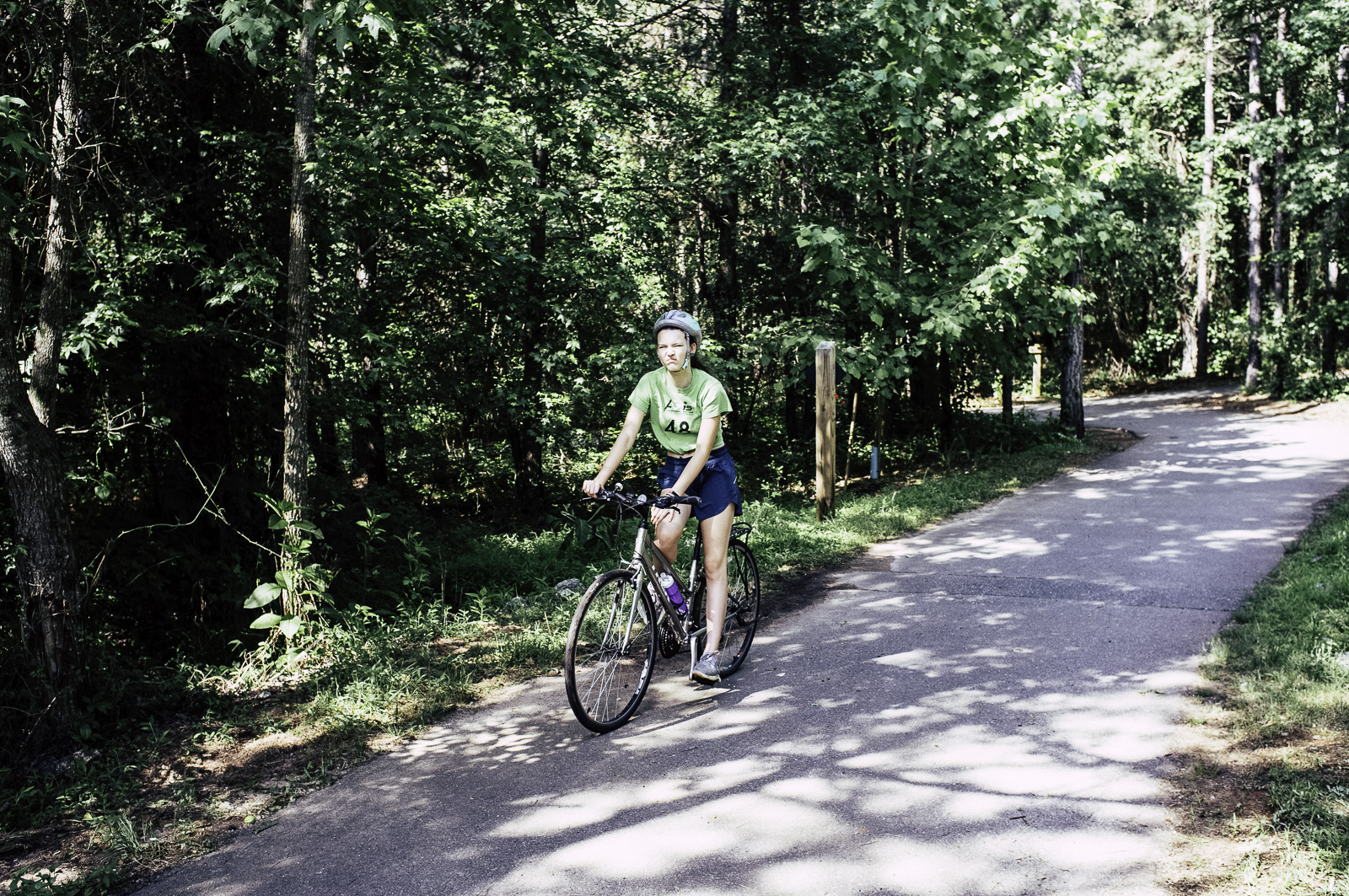
Today, they were open, so we went for a walk in the morning when it was likely to be less crowded. We kept our distance from everyone and behaved as model citizens.
The kids were just glad to get out and do something. Perhaps they were also glad to see other faces — I know I was.
But I’ve had concerns about this opening up of South Carolina. I don’t get the impression that everyone else is being as careful as we are. And the numbers prove it. Earlier this week, we had a day with 300+ new cases — the highest we’d ever had. Then we had a couple of more days in the 200s or high 100s range, then yesterday we saw that the number jumped up again. Today, there were 312, but there was also an addendum about yesterday’s count:
154 cases that should have been reported in yesterday’s positive case counts were not updated from suspected to confirmed cases in our database by the time yesterday’s news release was issued. An additional quality check of yesterday’s positive case numbers revealed the omission of these cases in the daily reporting total. The corrected total of positive cases for yesterday (May 30) has been updated to 420. (Source)
So we’ve gone from having no single day with more than about 280 to having a day with over 400. Just about two weeks after restrictions were eased. Which is to say that I’m afraid people’s stupidity (“This has all blown over — back to normal”) will cause a spike that will undo all we sacrificed over the last months.
In Rainbows
When Noah and the survivors emerged from the ark after God had wiped out all of humanity except them, there would have likely been some consternation: what if God decides to do this again and this time, we don’t make the cut? It seems God wanted to assuage exactly those fears:
Then God said to Noah and to his sons with him: “I now establish my covenant with you and with your descendants after you and with every living creature that was with you—the birds, the livestock and all the wild animals, all those that came out of the ark with you—every living creature on earth. I establish my covenant with you: Never again will all life be destroyed by the waters of a flood; never again will there be a flood to destroy the earth.”
And God said, “This is the sign of the covenant I am making between me and you and every living creature with you, a covenant for all generations to come: I have set my rainbow in the clouds, and it will be the sign of the covenant between me and the earth. Whenever I bring clouds over the earth and the rainbow appears in the clouds, I will remember my covenant between me and you and all living creatures of every kind. Never again will the waters become a flood to destroy all life. Whenever the rainbow appears in the clouds, I will see it and remember the everlasting covenant between God and all living creatures of every kind on the earth.” (Genesis 9.8-16)
A skeptic like me has a lot of issues with this passage. Well, there are a lot of issues about the whole story of Noah and the ark, not the least of which is God deciding to wipe out all of humanity instead of, say, coming down and teaching them how they’re making bad choices, like a parent would do. Perhaps a spanking of some sort if we want to get Victorian. Then there’s the question of getting all the species in the boat, the inexperience of Noah as a shipwright — just problems all over the place.
But just these few verses offer a couple of big issues: first, why does God need reminding? “I will see it and remember the everlasting covenant” not “you will see it and remember the everlasting covenant,” though I guess that’s implied. But I suppose we could work out some literary way to get around that.
What we can’t get around is the simple fact that text here seems to suggest that there was never a rainbow before this event: “Whenever I bring clouds over the earth and the rainbow appears in the clouds” certainly hints at this. So you see the opening: “You mean to tell me that the lingering droplets of water in the sky that act as a prism and break the sunlight into its various colors — an act of physics — never happened before this?” Rainbows are not mysteries: we know exactly how they form, and I would imagine that meteorological sciences have gotten to the point that they can list several conditions that need to exist before a storm that will set in action a chain of events that will end in said rainbow.
Apologists who take the Bible literally have to deal with this. How to do so? I suppose they could suggest that, yes, God altered the laws of physics at that moment. But a more common explanation is a little more baffling: it had never rained before the deluge, apologist suggest. Mists and dew and the like were enough to water the flora of the Earth.
I mentioned this to K: she raised her eyebrows. “That’s the first time I ever heard of that.” I suspect it’s an Evangelical (i.e., American Christianity) attempt at explaining an obvious problem with the Biblical text in such a way that allows believers to continue interpreting it literally, word-for-word.
I first heard that argument when I was a kid. I want to say, “It struck me as strange even then,” but I don’t really recall. I remember hearing it, so it made some kind of impression on me, and it stuck in the back of my head as another example of some of the odd contortions literalists bend themselves into in order to continue interpreting the Bible literally.
I heard it again tonight. Or rather, overheard it. I wasn’t involved in the conversation, just listening from the fringes. “I mean, God created the world so perfectly that they didn’t even need rain — just a mist was enough,” the apologist explained.
It was one of those times that I really wanted to jump into a conversation but knew that there would be no point. Neither of us would budge from our view.
Day 76: Reality in the Shower
We are a pattern-seeking species. And where we find patterns, there we find meaning. Even if that meaning is nonexistent because the pattern itself is an accident of nature. Instead of seeing it like this, though, we often prefer to take these as omens.
I’ve found a few omens, then, in our shower.
There’s a Grateful Dead teddy bear on one tile. I wouldn’t have even noticed it if I hadn’t been such a Grateful Dead fan in high school (now, not so much — they’re okay, but I rarely listen to them).
There’s a bandit with a kerchief covering his mouth. His eyebrows are straight and determined: he’s surely about to commit a crime. Perhaps a home invasion is imminent for us. But our little town is really quite peaceful (we checked with the police department and did some research before buying here), so it’s unlikely.
There’s a fetal-size footprint. Surely this is a hint of things to come? A prophecy of another child on the way? No. It’s just a shape.
There’s the number 12 — certainly, that is not an accident but, like Jesus burned into toast and the Virgin Mary on an underpass, a message from the heavens, some reference to the disciples.
Yes, this is a little something I wrote long ago and just tucked away for just such an occasion: I’m still working on pictures from the Mass I shot (a paying gig this time!) and won’t be done any time soon…
Day 75: Awards
Today was the last day of the school year. Were it a normal year, we would have had three more half days. They’re useless for instruction: we’ve already completed grades, and what can you do with half days? Students clean out their lockers, sign each other’s yearbooks, have field day (or in eighth grade’s case, eighth-grade day, which differs from field day only insofar as the PTSA feeds the kids at the end of it all), and sundry end-of-the-year things. I use that time usually to pack up my room: I have lots of kids, empty boxes, and books — they make short work of what would take me a couple of hours. Were it a normal year — but it wasn’t, and three half-days of online instruction when a normal day of online instruction means thirty minutes of work per class — well, it just doesn’t make sense, and much to my surprise, the district realized that and basically thought like teachers for a change.
The Boy’s teachers had an awards day Google Meet — a very sweet thing for them to do. They recognized academic achievements like the A/B honor roll. When they began talking about it, I asked E if he thought he as on it.
“I don’t know.”
Indeed, I didn’t either. I knew he’d struggled mightily with a few things, and he was able to finish tests only because the teachers allowed him extra time. “I have to pay for it with less time on the playground, because that’s when I finish,” he once explained, “but that’s okay.”
But there was his name on the list, and there was a big smile on his face. High fives from everyone.
Is it a bad thing that I honestly had no idea whether or not he’d made the honor roll? I don’t think so: in second grade, grades appear for the first time. Everyone’s getting used to them. They’re not meaningless, but they’re not all that important, so I never really worried about his grades. I don’t quite think it was the same for K, but she never made a B (or 4 in the Polish system) even in her worst nightmares, so she put a little more weight on the grades. And to be fair, aiming high is always a good habit to develop. It’s not that I wanted him to settle. It’s just — well, it was second grade. I don’t remember a thing from second grade.
At the end of the program, they gave every single student a special award: most likely to — superlatives, in other words. E won “Most likely to win an episode of Survivor.” The other day during a Google Meet, E showed everyone his survival kit and told them a little about our adventures. That was what stuck in the teachers’ minds, and it was a cute award that just made E’s day.
What superlative would I give him? Sometimes, with his sensitive nature and keen sense of right and wrong, I think he’s most likely to have his heart broken in as many ways as one can imagine. He sometimes gets so frustrated with others’ unwillingness to follow basic rules. “That’s just not nice!” he concluded many stories about some tragedy that befell him in school. This is not to say that I assume he’s always an angel: many of our conversations involved me trying to help him see how he could have been nicer. Still, he’s a very by-the-book fellow, and it upsets him that others aren’t.
Maybe “Most likely to brighten someone’s day.” He can sure do that, but that requires a bit of familiarity. He’s not entirely comfortable approaching, say, a lonely kid on the playground that he doesn’t know but who might need someone to play with. The unknown — he’s not keen on that.
Maybe “Most likely to be an engineer.” He does love building things.
Or just “Most likely to make his family proud.”
As for the Girl, she got the good news that she definitely made it into geometry and English I Honors. That means she’ll be taking the course that I will teach exclusively next year. Were she a student at our school, that might cause problems: I wouldn’t want to stress of grading my own daughter.
For me, what’s more impressive is the geometry. I didn’t take geometry until tenth grade. She’s two years ahead of me.
She was worried about the possibility of not making one or both of those classes. Being a teacher and knowing how things often work behind the scenes, I knew it was unlikely. But I also knew that no “behind the scenes” would be necessary: she’s worked very hard this year, and she’s make sure that her grades are not just good grades but reflections of her actual understanding. She and K spent many an hour going over this or that algebra trick, and it all paid off.
So congratulations to both our kids!
Day 74: Rainy Dickens
Another Rainy Day
We are sick of the rain. Simply sick of it. Every day for the last — how long has it even been? A week? Day in, day out, at some point during every single day, it rains. The air is heavy and moist, and it’s just not a pleasant experience — though it could be worse with all the flooding others are getting.
Today, we finally got outside in the afternoon. It was muggy but sunny. What else could we do but head back to our new fort location and work on it. Doing what exactly? Well, chopping things down.
Some things were much easier to chop than others. The mushy, termite-infested stump we discovered to be such a few months back when I gave what appeared to be a 10-foot stump a push and broke it off about two feet from the ground — that stump is quite solid a little further down.
Of course, the sprinkles that filled the morning and early afternoon and kept us inside came back with friends in the early evening just as we got back from our walk.
I took a few experimental shots — long exposure. Long exposure for daylight pictures. The above image was about 15 seconds. I don’t know what I was hoping to accomplish — get streaks of rain in the image, I guess — but it just turned out to be a bland shot of our front yard.
Later in the evening, we tried it inside. When I explained what a long exposure inside would do, the kids thought it was a very unique idea. “Make us ghosts!”
Done.
Dickensian Commonalities
I’ve been listening to Dickens’s Dombey and Son on Spotify this week — the first time in close to 20 years that I’ve read a new (to me) Dickens book. One of the things that I’m enjoying most is the simple pleasure of discovering new examples of Dickensian acerbic wit, like this:
After the lapse of some minutes, which appeared an immense time to little Paul Dombey on the table, Doctor Blimber came back. The Doctor’s walk was stately, and calculated to impress the juvenile mind with solemn feelings. It was a sort of march; but when the Doctor put out his right foot, he gravely turned upon his axis, with a semi-circular sweep towards the left; and when he put out his left foot, he turned in the same manner towards the right. So that he seemed, at every stride he took, to look about him as though he were saying, “Can anybody have the goodness to indicate any subject, in any direction, on which I am uninformed? I rather think not.”
Add to that a classic Dickensian name — can there be a more inept educator than someone named Doctor Blimber? — and it just brought out of me a loud laugh.
I’m discovering too that this is another example of Dickensian exposes on the Victorian view of children, which often enough bordered on abuse. And as always, Dickens does it with a flourish of humor that still has enough darkness around the edges to make the reader shudder just a little at what the child must be going through.
Poor Paul Dombey, at six, has been deposited at a boarding school in an effort to make up lost time in his education due to his generally ill condition. The headmaster, Dr. Blimber of above, is known for instilling in the children a thorough knowledge of Greek and Latin grammar and little else and of assuming that he’s aptly prepared his pupils for the challenges of life. Paul, on his second day of school, is given a pile of books to read and master. He does the best he can with them:
‘Now, Dombey,’ said Miss Blimber. ‘How have you got on with those books?’
They comprised a little English, and a deal of Latin—names of things, declensions of articles and substantives, exercises thereon, and preliminary rules—a trifle of orthography, a glance at ancient history, a wink or two at modern ditto, a few tables, two or three weights and measures, and a little general information. When poor Paul had spelt out number two, he found he had no idea of number one; fragments whereof afterwards obtruded themselves into number three, which slided into number four, which grafted itself on to number two. So that whether twenty Romuluses made a Remus, or hic haec hoc was troy weight, or a verb always agreed with an ancient Briton, or three times four was Taurus a bull, were open questions with him.
‘Oh, Dombey, Dombey!’ said Miss Blimber, ‘this is very shocking.’
‘If you please,’ said Paul, ‘I think if I might sometimes talk a little to old Glubb, I should be able to do better.’
‘Nonsense, Dombey,’ said Miss Blimber. ‘I couldn’t hear of it. This is not the place for Glubbs of any kind. You must take the books down, I suppose, Dombey, one by one, and perfect yourself in the day’s instalment of subject A, before you turn at all to subject B. I am sorry to say, Dombey, that your education appears to have been very much neglected.’
‘So Papa says,’ returned Paul; ‘but I told you—I have been a weak child. Florence knows I have. So does Wickam.’
‘Who is Wickam?’ asked Miss Blimber.
‘She has been my nurse,’ Paul answered.
‘I must beg you not to mention Wickam to me, then,’ said Miss Blimber. ‘I couldn’t allow it’.
‘You asked me who she was,’ said Paul.
Bear in mind that Paul at this point is six years old. “How is your Latin grammar?” asks the headmaster. “I am sorry to say, Dombey, that your education appears to have been very much neglected,” declares his tutor, the headmaster’s daughter. Just what were they expecting of a six-year-old boy?
Day 73: Changes and Changes
Changes I
K has moved into real estate, though she hasn’t quite working part-time at her old job. She likes the security it provides. I tell her that things are going fine with real estate: she’s just helped a client buy a house, she’s got two other clients she’s helping, and one of them might be completing two transactions using K’s services. “It’s all only potential earnings,” seems to be her mantra, and that’s why she’s reticent to quit her hold job completely.
It was a little ironic, then, that one of the memories that popped up in the Time Machine widget at the bottom of the page had to do with our first day out house hunting.
Criteria, Part II
I read through what I wrote then and realize that neither K nor I really knew what we were doing. That’s to be understood — it was the first time we’d bought a house. Still — were we really so green?
That’s one of the reasons I continue writing this thing — evidence of how much things have changed.
How E and I play-build has changed. It used to be something we did almost exclusively in his room, using blocks and Legos and Tinkertoys and whatever else we could find. It still is, to be sure.
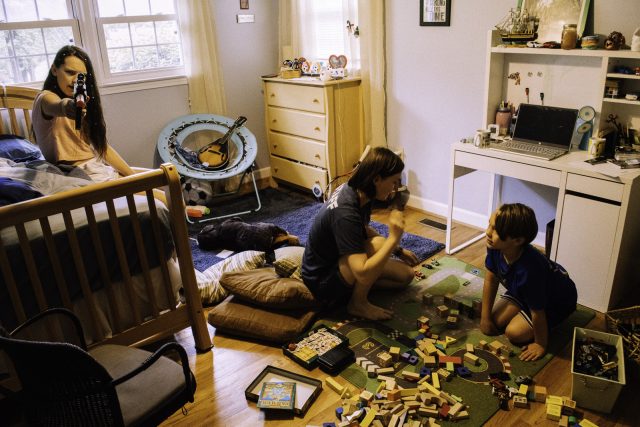
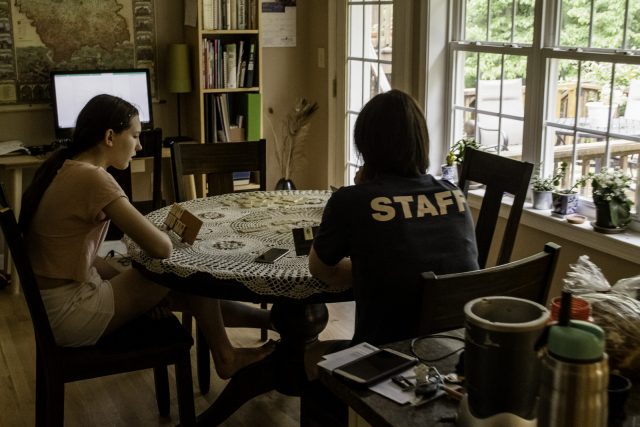
But we often find ourselves outside building something more substantial. Or at last more in the Boy’s mind’s eye, that’s what we’re doing. His plans are often overly-ambitious, as every eighth-year-old’s plans should be. But as we begin working, more realistic goals form.
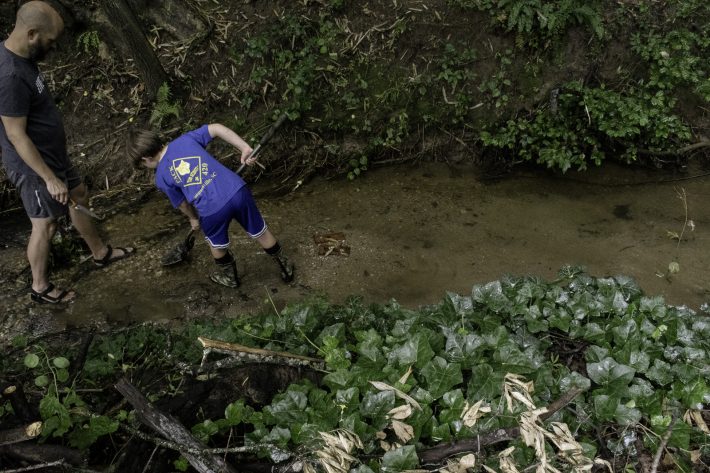

One thing that will never change is the sadness we feel on May 27 from now on — the one year anniversary of Nana’s passing.

I look back on that day and remember very little about it. I know took the dog for a walk around lunchtime and listened to Mozart’s Requiem. I know Papa and I had a scotch on the back porch that evening. But it was Memorial Day — it slowed the pace significantly, which perhaps was a good thing.
And what of today? A year on? Papa still gets blindsided by it occasionally. That’s to be expected; that will never go away. I do, too. Also to be expected.
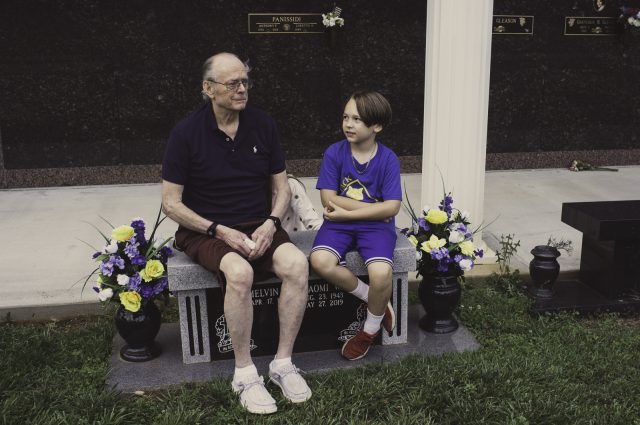
Changes II
I was going through some pictures from 2003 around K’s family house at Easter. I hadn’t realized how much things had changed.
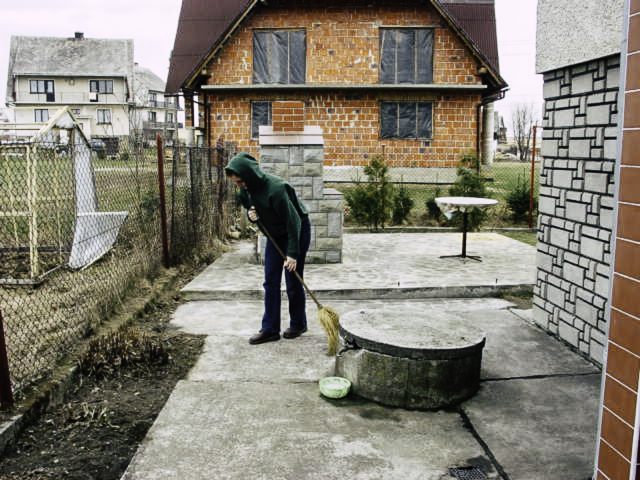
Those saplings in the neighboring lot — they completely hide the house now. That pad of concrete with an outdoor oven on it — enclosed and roofed. (That was done long before we left, though.) That fence to the left — hidden by a taller fence of wood to hide the field behind it. But the house itself, the one in the background still under construction — exactly the same.
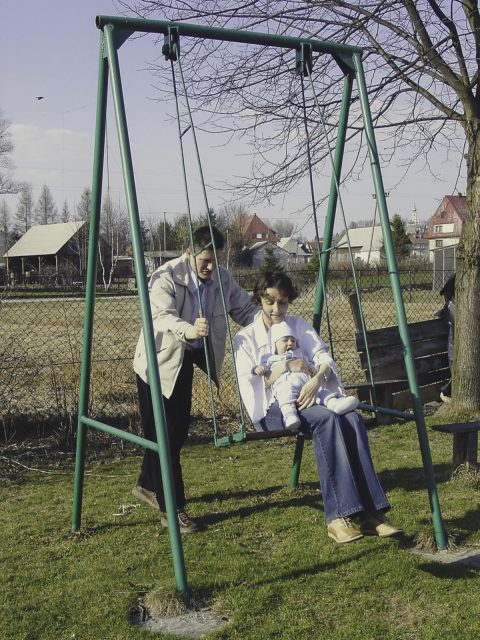
That little baby, K’s nephew — a seventeen-year-old high school student. The field behind the happy family — storage for a building materials company. But the swing — still there, still exactly the same. The wooden seat has possibly been replaced, but who knows. Maybe it’s still the same one.
One more change — the most significant:
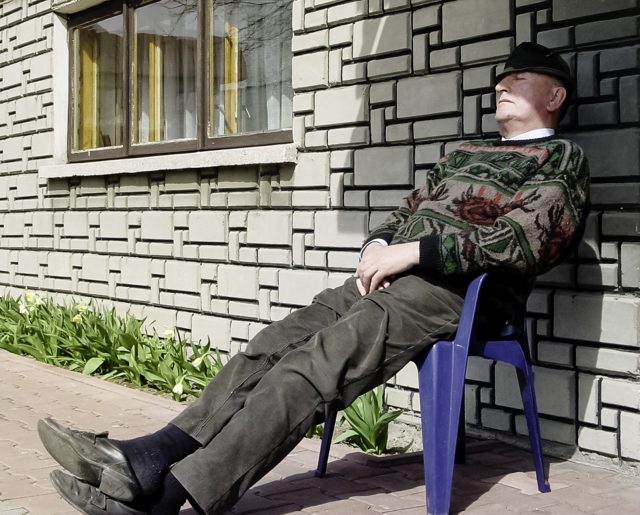
Day 72: Reflection and Time Together with a Tripod
Reflection
I titled the post “Heading Out.” It comprised one single picture:
The Boy and I were going out for a Sunday-morning ride. We rode about our neighborhood, the neighboring neighborhood, up to his school, back — a typical ride for us. If there were any puddles I would have had to tell him not to ride through them.
We got back sweaty and satisfied, and after a shower, we had lunch with Nana and Papa and then I headed out to photograph a special ordination Mass for a deacon in our parish, Deacon Richard — now Father Richard.
At some point during the afternoon — I don’t remember because I wasn’t there — Nana went to sleep. K must have texted me about it because I remember thinking, “Well, we gave her an opioid — she always goes to sleep after that.” The Mass ended and the reception began, and after an hour and a half of the reception, K texted me that I should probably come home. “It doesn’t look good,” she texted.
Still, I wasn’t worried. “She’s just asleep. The opioid’s effect will wear off and tomorrow morning she’ll be just as good as new.”
That was May 26, 2019. She passed away sometime in the early hours of May 27. We’re not exactly sure when even though the death certificate has the time the hospice nurse came and checked: 7:30.
“Tomorrow morning she’ll be as good as new.”
I’m not sure how I could have been so blind other than to suggest it was self-deception out of a sense of self-protection. A lot of “self” in that.
“Can we have some time together?”
The Boy asks me every day, “Can we have some time together?” On the one hand, that makes it sound like I don’t spend a lot of time with him. “Poor kid — has to ask his father to spend time with him.” It sounds positively Dickensian. On the other hand, that shows how conscientious he is about spending time with me: he wants to make sure the day doesn’t slip by without us doing something together, and that has happened.
Today, I had some work to do, though, after I completed my school responsibilities (only three more days) and before I could play. The Boy is always eager to learn how to do something, so I invited him along.
Spraying for pests suits him, I think.But then again, you do have to be somewhat systematic — follow a pattern, a plan, a path. You can just spray here, spray there. You have to make sure you have even coverage over the whole area you’re hoping to affect. Much like with mowing, then, I let him work but often took back the equipment to hit a spot he’d missed.
After the work (“Is this our time together?” the Boy asked, concerned), we went back to our favorite spot in the creek and discovered, much to our surprise, that the island we use to assist in crossing the creek was gone. The last flood must have washed it out completely.
We also started planning our next fort. We might get a little less primitive this time. We might even use some 2x4s.
Tripod
I took the camera and tripod out with us today and set the camera to take a picture every minute.
Why didn’t I do that before? I don’t have many pictures with the Boy when we go on these adventures. It’s a simple way to solve that problem.
One can also reverse-mount the tripod and take some pictures otherwise impossible: three-second exposures at water level. That type of thing.
Day 71: Playing and Counting
Games We Play
This morning, E and I decided to play a game we hadn’t played in ages: Pentago. It’s a simple concept: Get five marbles of your color in a row. But the challenge is that each of the four nine-by-nine quadrants can be rotated. It’s a great game for the mental manipulate of objects because players have to turn those quadrants in their heads and make plans to try to surprise their opponent with an unseen 5-row connection.
At first, the Boy just tried to connect five in a row. I showed him quickly how easily stopped that could be, and how I could simply build on my efforts to stop him and create my own row with a twist here or there. Then he got it.
Did I “let him win”? Well, not so much. Once he figured out the importance of the twist, I played a while without really paying attention to anything other than his obvious efforts and he sneaked one or two by me.
After each game: “Can we play again?”
In the afternoon, the kids brought the old Rummikub satchel out: “Can you teach us how to play this?” they asked.
Indeed — I could barely remember myself. Something about runs and threes- and fours-of-a-kind. That was about all I could remember, and there were no instructions in the game.
It’s moments like that which make me really appreciate YouTube. A quick search, three minutes of watching the video, and off we went, playing a game I hadn’t played in decades.
I last remember playing it in Nashville with Uncle N and Aunt L over the Thanksgiving weekend. We might have played it the last time we were there for Thanksgiving, which would have been 2005. Though we could have just played dominoes and Uno — that’s all I have photographic evidence for:
Uncle N passed away less than a year later from ALS, and we never went back there for Thanksgiving. So it might have been even longer since I played Rummikub. At any rate, the kids loved it. The Boy, less so because he couldn’t see all the combinations and such. L, however, fit into the game perfectly: that type of kombinowanie is just what she does best.
Yesterday
We watched last night the 2019 film Yesterday, in which a failing musician somehow enters an alternate reality in which only he knows anything about the Beatles. He subsequently recreates their catalog as his own. As expected, there are lots of Beatles songs in the film.
“Is that a Beatles song?” L asked as one started.
“Is that a Beatles song?” E asked with the next one.
“Yes, they’re almost all Beatles songs,” I explained.
“How many songs did they write?!” the Boy asked incredulously.
As a result, we listened to a lot of Beatles music this afternoon. They kind of liked it — we kind of encouraged them.
It did inspire some musicality from them. The Boy has a little guitar that he suddenly became interested in. However, it is missing strings, so I suggested he play my mandolin, which I bought in high school because R.E.M. had released Green, which featured the mandolin on a number of tunes. It’s a $100 plywood job that’s a perfect size for him.
Tonight, I worked with him on some basic ideas: pressing down strings just behind a fret to change the pitch. Chords? They’re a long way off. (Besides, I can only remember four or five chords on a mandolin.)
The Girl, who has been toying with a ukelele from time to time, gave it a try only to be shocked at how very different it was tuned from her uke. (When she first got the uke, I was surprised to find that, like a five-string banjo, the highest string is actually in the position where the lowest string is for most other instruments. They both just have that one out-of-place string that always gives me fits.)
We’ll see how this develops, but hopefully, the interest will remain.
When do I stop counting?
When is this quarantine officially over? When do I stop prefacing every post with “Day X”? I started the first day we were supposed to go to school and yet didn’t — March 16.
Yet because we don’t have any coordinated national approach and since every state is easing restrictions step-by-step, there’s really no firm date for me to stop doing that. When we head back to school on a normal routine? (Will we do that in the fall?) I’ve decided that the most logical date to stop doing that is June 4, which would have been the last day of school were this a normal year.
On the other hand, I’m fairly certain that we will see an enormous uptick in cases after states have eased these restrictions. Just look at Cocoa Beach in Florida this weekend:
It’s concerning, to say the least:
On the Sunday talk shows, Dr. Deborah Birx, the coordinator of the White House coronavirus task force, said she was “very concerned” about scenes of people crowding together over the weekend.
“We really want to be clear all the time that social distancing is absolutely critical. And if you can’t social distance and you’re outside, you must wear a mask,” she said on ABC’s “This Week.” (Source)
If we have an explosion of cases, the very thing we were trying to avoid, then this entire 70+ lockdown will have been for nothing. Absolutely nothing.
Are we smarter than that as a species? Most days I have my doubts.
Counting
I’m on a run: I’ve never posted so many consecutive days on this site. Not even close. I’ve posted daily since December 21, 2019. Counting roughly, that’s 130+ consecutive days. Why? Why not?
Not only that, but for the month of May, I’ve written an average of 1,047 words a day. That’s like my journal writing when I first arrived in Poland and everything — everything — fascinated me endlessly.
Of course, I have cheated a few times: I included long quotes from books I’m reading, in part because I was honestly interested in writing a little something about them, in part (at least once) because I just wanted to reach that arbitrary number (like I just did in this paragraph). One thousand words. At least. Every day.
I can’t possibly keep that up. The quarantine is helping with that. But daily posts? Could I make it a full year? Probably. Will I? No idea.
Day 70: Flood
It started raining around two this afternoon, first sporadic rain with fat, lazy drops, then steady rain, then torrential rain.
In the past, such rain worried me because of flooding in our basement. With the leak in our roof, I now have different concerns. As the storm grew and the wind blew harder, I wonder whether or not I’d secured the two tarps protecting our roof well enough to keep them in place with such a storm. There was really nothing I could do about it at the time, of course: it would not have been remotely safe to head onto the roof in a storm to put down additional weight to keep the tarps from flying off.
In the end, my worries were for nothing: the tarps stayed in place; the sump basin didn’t even have much water in it, so the basement wasn’t even close to being threatened.
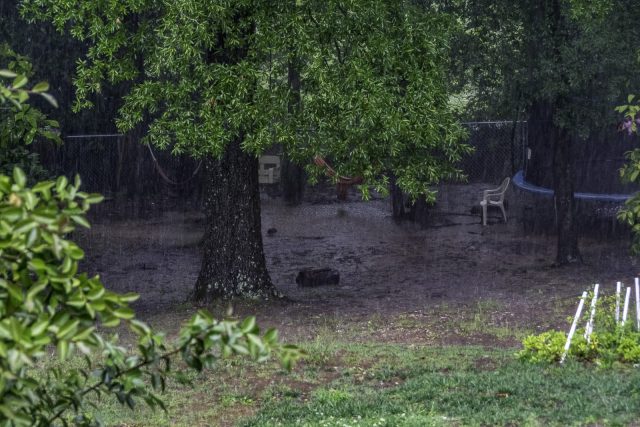
Yet we still had a lake in our backyard: the creek didn’t crest but we had essentially one big puddle in the lowest part of our yard, so after we finished playing a game (“Ticket to Ride” — I never play to win; I play to block other players — you can’t lose if you’re not trying to win!), E and I struck out to see what was going on in the neighborhood.
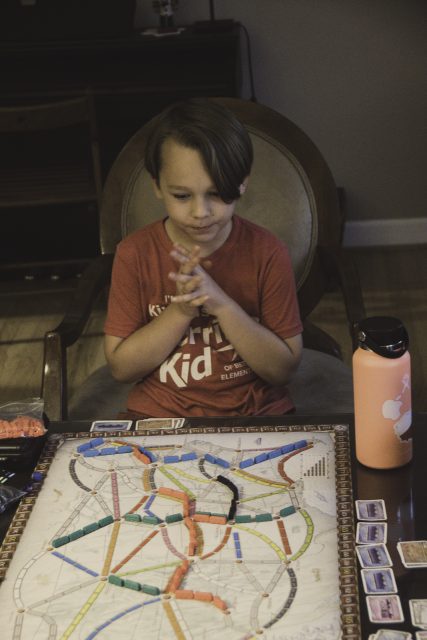
We weren’t prepared for what we found:
To begin with, there is a house basically in a hole that has an enormous backyard — I thought it was a park when we first moved here.

The road that goes by it was closed because their yard, which is in reality just a drainage basin for the surrounding community, was completely flooded.

Completely.

So much so that the culvert under the road was completely submerged, creating a whirlpool as the water tried to drain.
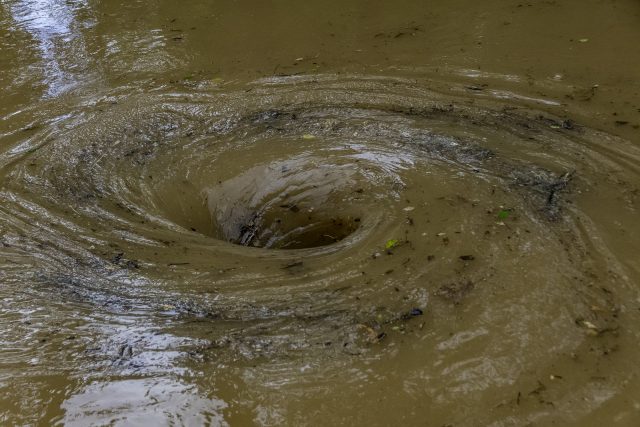
We stood in the road looking at the whirlpool, right at the edge of the water. We’re past the time of E asking questions like, “Daddy, what would happen if I fell in that water?” He knows. He likes to show he knows. “Boy, Daddy, if I fell in that…” and his voice trailed off for effect.
It gave me a little shudder, the shudder of a parent having nightmarish visions of the worst possible outcome. Once such thoughts enter my mind, it’s hard to shake them. The Boy seemed to realize that. “Come on, Daddy, let’s go back to the other side.
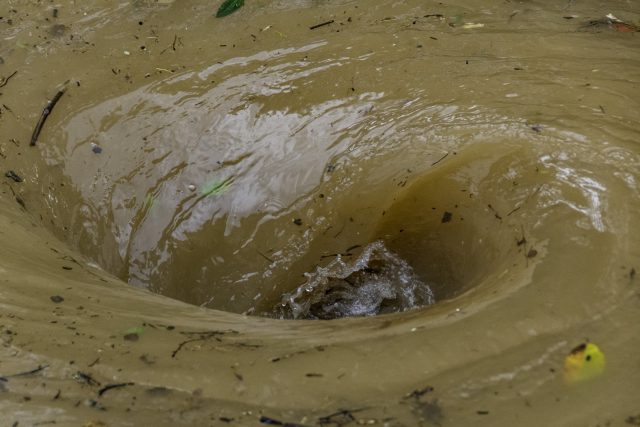
All that water — undoubtedly the worst flooding we’ve seen there. It was still nothing compared to what we saw later, downstream. We walk by here almost every night — it’s K’s favorite walk.
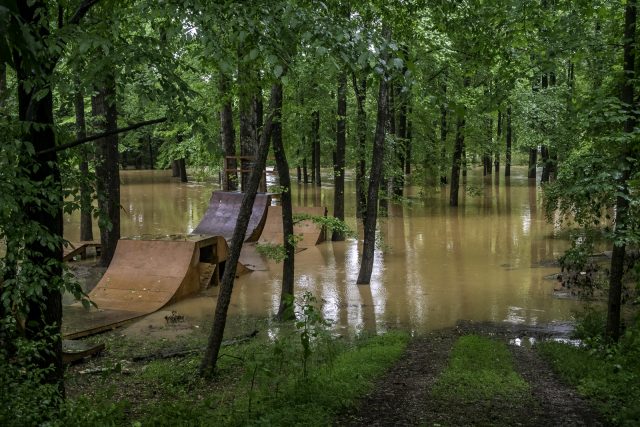
The creek that was forming the whirlpool earlier joins with another creek at this point, and the two completely covered the flat land around it.
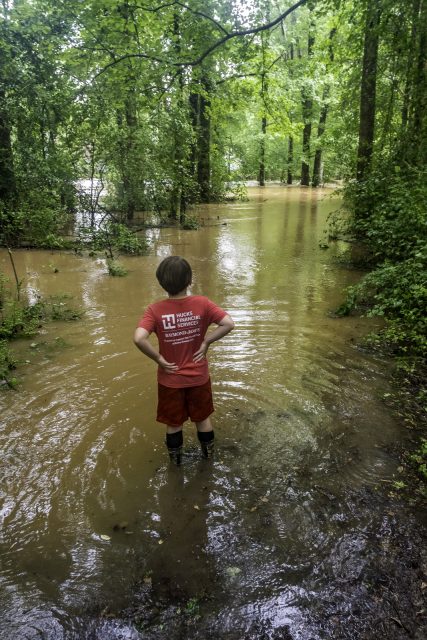
We headed back home, still having fun on the way.
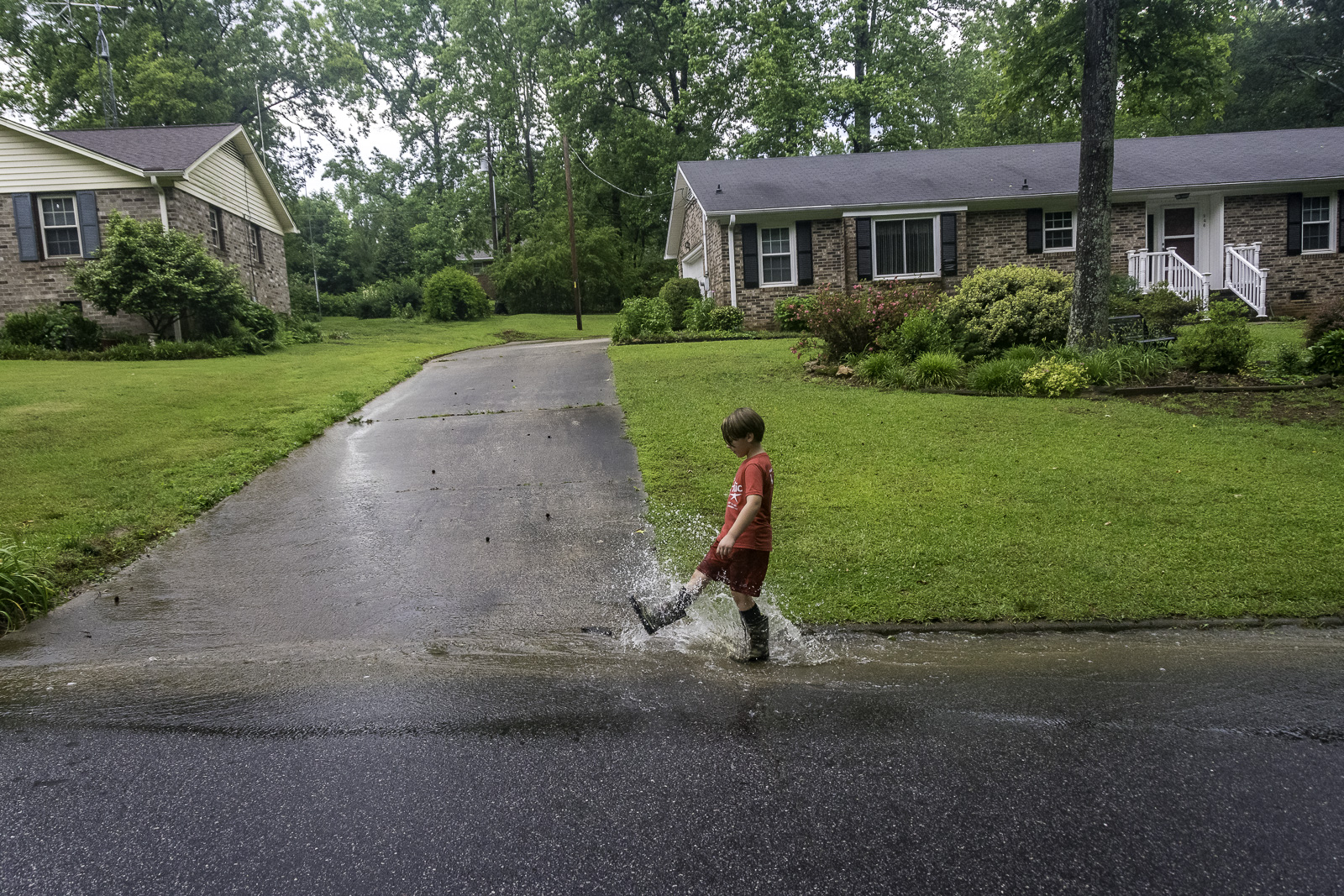
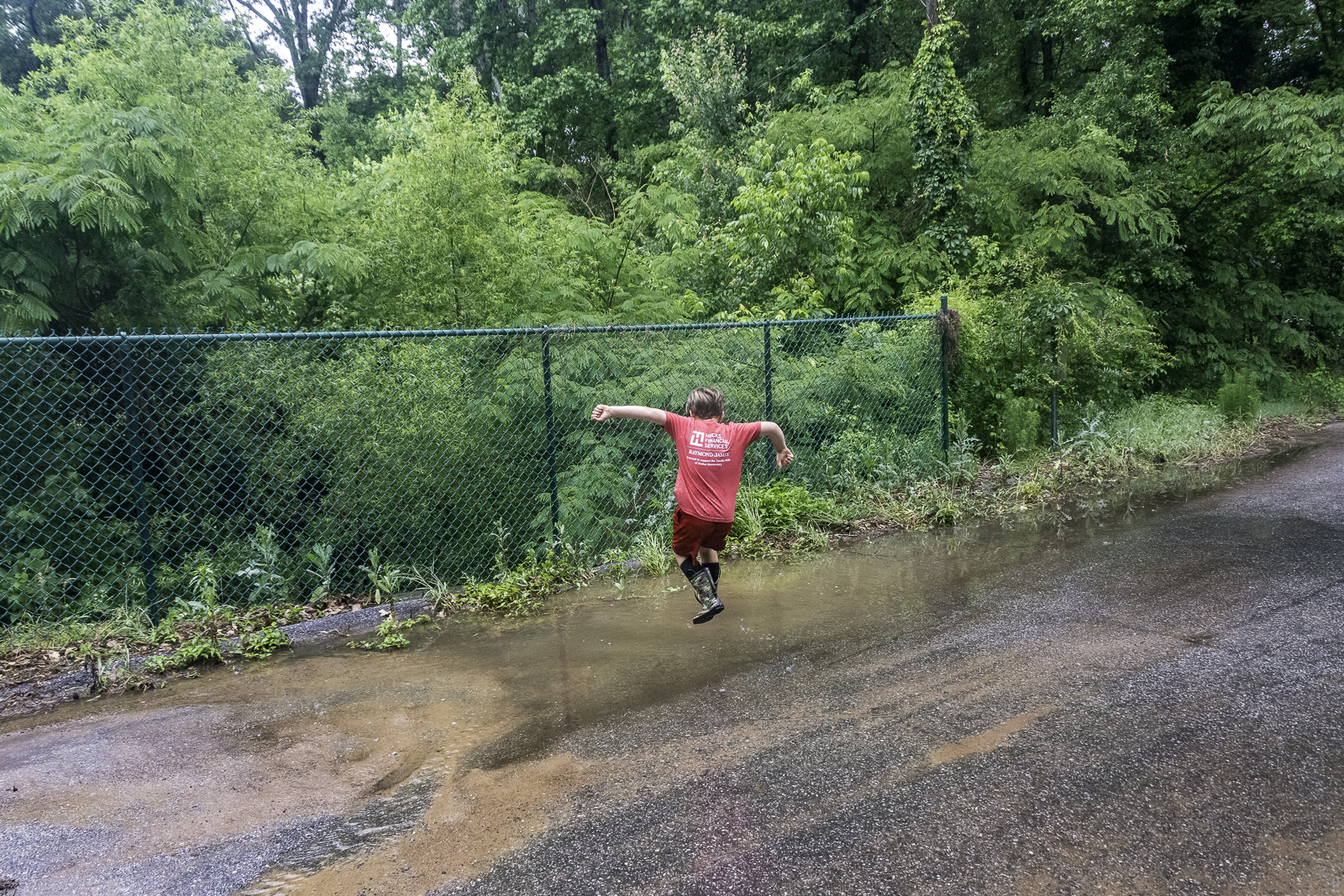
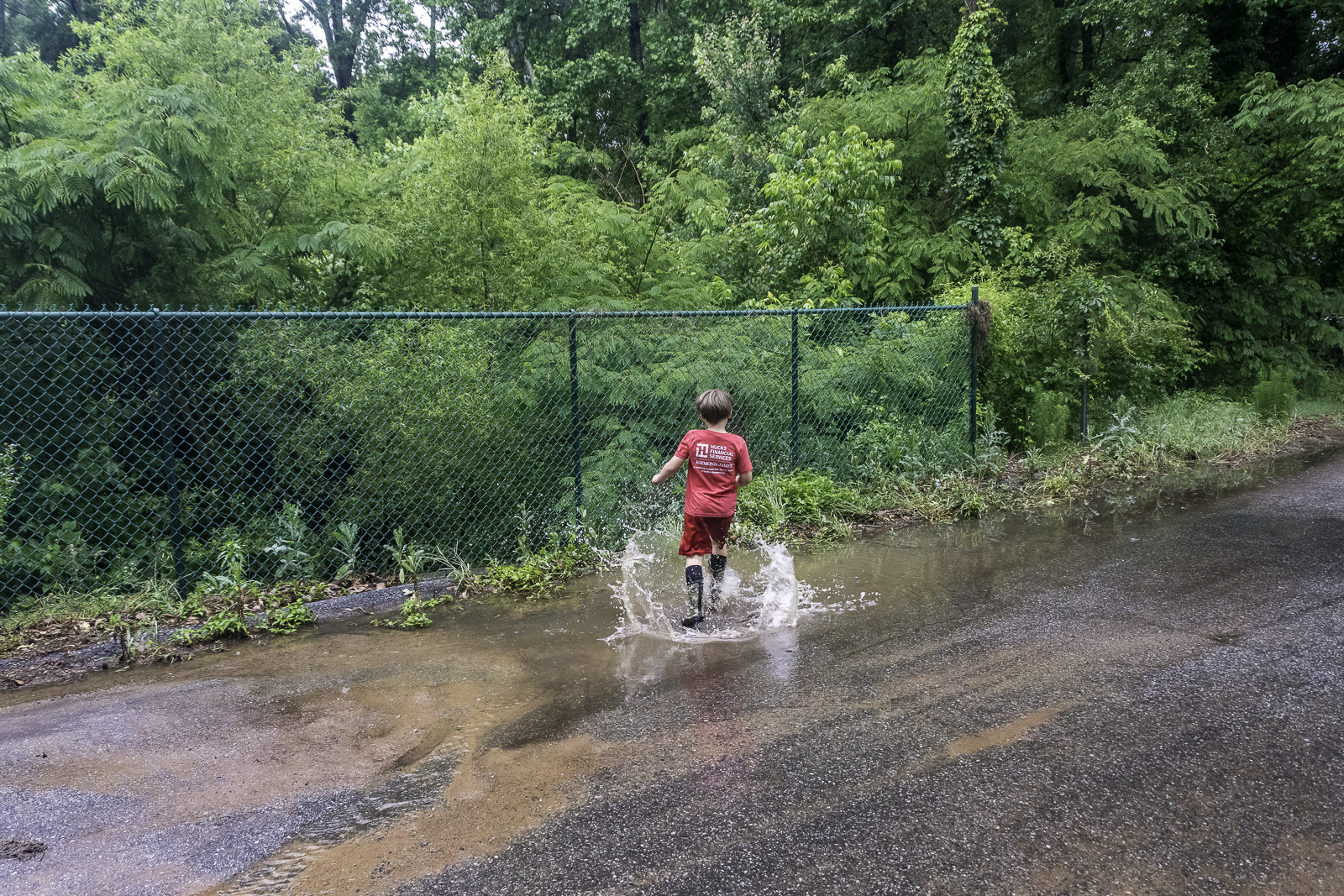
In the evening, we went for a walk to show the girls what it looked like. Of course, most of the water had subsided, but there was still enough to be impressive, and just enough to enjoy safely.
Day 69: Training, Cleaning, and Reading
Our pup has come a very long way. I thought, when we got her, that since she’s a border collie (smartest breed on the planet, right?), things would be easy. She’d be easy to train, easy to control (after all, you can get those dogs to do the most amazing tricks herding sheep), easy to house-break — just easy. But it turns out that BCs are too smart for their own good: it makes them a little stubborn at times. And that describes our Clover perfectly: stubborn, stubborn, stubborn. But we didn’t give up on her: we took her for some obedience training, we left her a couple of times for one-on-one days with a trainer, and for the last year, things have been going great.
Now, we have a few tricks with her.
- You can, for instance, drop a piece of the most tempting meat in front of her and she’ll just sit down at it, shifting her gaze from the meat to you and back to the meat, a pleading look in her eye, and she won’t touch it until you tell her, “Eat.”
- In the morning, you can open the door and tell her, “Siusiu,” and she’ll go out and immediately relieve her self and come back inside.
- You can call her and she comes and sits beside you.
- If you want her on the other side, just say “Other side” and she’ll switch sides.
- You can tell her to stay and then kick ever her most beloved ball and she won’t go darting after it until you tell her “free” or “go get it” or “release.”
- “Heel” means “heel.”
- When you’re taking her for a walk and stop moving, she sits — sometimes immediately, but usually after a bit of hesitation. (There’s that stubbornness.)
For her birthday, though, we got her an agility course. The Girl began training her yesterday. It was fairly simple: she figured out that she had to jump over the bar, had to jump through the hoop. Easy-peasy. She looked up at L like she looks up at me when we go for a run: “Was that supposed to be a challenge or something?”
Today, the Boy got in on the fun. He had a little difficulty getting her to jump without a leash on her to guide her, but soon enough, he’d worked out his own way of bribing her with a little treat.
My Ántonia
I finished reading My Ántonia today — or rather, listening to it on Spotify. I first read that book in college, and it astounded me, particularly one quote: “Some memories are realities, and are better than anything that can ever happen to one again.” More than O, Pioneers! (the only other Cather book I’ve read), I really connected with the sense of nostalgia that pervades My Ántonia. That’s why I remember that quote almost a quarter of a century later: I read it shortly after some emotionally traumatic losses (not deaths, just losses) in my life, and I was wallowing in nostalgia about those lost relationships.

I had forgotten, though, about the ending:
This was the road over which Ántonia and I came on that night when we got off the train at Black Hawk and were bedded down in the straw, wondering children, being taken we knew not whither. I had only to close my eyes to hear the rumbling of the wagons in the dark, and to be again overcome by that obliterating strangeness. The feelings of that night were so near that I could reach out and touch them with my hand. I had the sense of coming home to myself, and of having found out what a little circle man’s experience is. For Ántonia and for me, this had been the road of Destiny; had taken us to those early accidents of fortune which predetermined for us all that we can ever be. Now I understood that the same road was to bring us together again. Whatever we had missed, we possessed together the precious, the incommunicable past.
“What a little circle man’s experience is.” What a lovely notion, what a great truth.
Returning to Dickens
“What to listen to now?” I thought, as I finished the Cather novel early in the day and still had plenty of outside work to keep me occupied. Much of the morning I spent cleaning rocks. Yes, cleaning rocks. The drainage trough (for lack of a better term) I made at the base of our driveway has, over the years, become more and more clogged with dirt. Now instead of wicking water away from the drive, it just serves as a barrier and makes it puddle water. What’s more, with all that dirt, weeds had a great place to grow. So I pulled out all the rocks down to the landscaping fabric, washed the dirt off the rocks, and put them back. (Coronavirus quarantine has lent itself to long-ignored, not-necessarily-critical projects.) Anyway, I was still working on the rocks and the book finished.
Spotify is sort of hit-or-miss with audiobooks: there’s very little (that I’ve found) that’s relatively recent, and a lot of the older books are actually in translation — lots and lots of German audiobooks I’ve found.
When I lived in Poland, I had some difficulty finding affordable English-language books. Penguin Classis, though, were plentiful and relatively cheap. That’s how I read almost every Dickens book in the space of three years. There are a few that I never found, though, and I thought today might be a good day to return to Dickens.
I hadn’t really read him in almost twenty years. I teach Great Expectations some years to my English I Honors students, but that doesn’t really count: the last year I taught it (two years ago, I think), I didn’t even read it with the students.
So today I began Dombey and Son. I’d forgotten how clever and witty Dickens can be, and how gifted he can be at beginning a novel. Think of his most famous, A Tale of Two Cities:
It was the best of times, it was the worst of times, it was the age of wisdom, it was the age of foolishness, it was the epoch of belief, it was the epoch of incredulity, it was the season of Light, it was the season of Darkness, it was the spring of hope, it was the winter of despair, we had everything before us, we had nothing before us, we were all going direct to Heaven, we were all going direct the other way— in short, the period was so far like the present period, that some of its noisiest authorities insisted on its being received, for good or for evil, in the superlative degree of comparison only.
Or my personal favorite Dickens beginning, which I’ve mentioned here before, Bleak House:
London. Michaelmas term lately over, and the Lord Chancellor sitting in Lincoln’s Inn Hall. Implacable November weather. As much mud in the streets as if the waters had but newly retired from the face of the earth, and it would not be wonderful to meet a Megalosaurus, forty feet long or so, waddling like an elephantine lizard up Holborn Hill. Smoke lowering down from chimney-pots, making a soft black drizzle, with flakes of soot in it as big as full-grown snowflakes—gone into mourning, one might imagine, for the death of the sun. Dogs, undistinguishable in mire. Horses, scarcely better; splashed to their very blinkers. Foot passengers, jostling one another’s umbrellas in a general infection of ill temper, and losing their foot-hold at street-corners, where tens of thousands of other foot passengers have been slipping and sliding since the day broke (if this day ever broke), adding new deposits to the crust upon crust of mud, sticking at those points tenaciously to the pavement, and accumulating at compound interest.
Fog everywhere. Fog up the river, where it flows among green aits and meadows; fog down the river, where it rolls defiled among the tiers of shipping and the waterside pollutions of a great (and dirty) city. Fog on the Essex marshes, fog on the Kentish heights. Fog creeping into the cabooses of collier-brigs; fog lying out on the yards and hovering in the rigging of great ships; fog drooping on the gunwales of barges and small boats. Fog in the eyes and throats of ancient Greenwich pensioners, wheezing by the firesides of their wards; fog in the stem and bowl of the afternoon pipe of the wrathful skipper, down in his close cabin; fog cruelly pinching the toes and fingers of his shivering little ‘prentice boy on deck. Chance people on the bridges peeping over the parapets into a nether sky of fog, with fog all round them, as if they were up in a balloon and hanging in the misty clouds.
Dombey, though, has a clever opening:
Dombey sat in the corner of the darkened room in the great arm-chair by the bedside, and Son lay tucked up warm in a little basket bedstead, carefully disposed on a low settee immediately in front of the fire and close to it, as if his constitution were analogous to that of a muffin, and it was essential to toast him brown while he was very new.
Dombey was about eight-and-forty years of age. Son about eight-and-forty minutes. Dombey was rather bald, rather red, and though a handsome well-made man, too stern and pompous in appearance, to be prepossessing. Son was very bald, and very red, and though (of course) an undeniably fine infant, somewhat crushed and spotty in his general effect, as yet. On the brow of Dombey, Time and his brother Care had set some marks, as on a tree that was to come down in good time—remorseless twins they are for striding through their human forests, notching as they go—while the countenance of Son was crossed with a thousand little creases, which the same deceitful Time would take delight in smoothing out and wearing away with the flat part of his scythe, as a preparation of the surface for his deeper operations.
Of course, Dickens can be tiring with all his subplots and sub-subplots (after all, the longer he stretched novels, which were always published in syndication in magazines, the more money he could make from a given book), but I’m thinking he’ll be a lot easier to listen to than read.
Day 68: Training Death and the Maiden for Exploring
Death and the Maiden
My friend M grew up on a farm with his grandparents. His father passed away; I never really knew what happened to his mother. But from the time I met M, he lived with Ma and Pa as he called them, and as I came to call them.
Their farm was just outside the city limits, a place in the county that felt so different and distant from my suburban, cookie-cutter neighborhood that I felt I might be in a different state. In a different country.
We spent a fair amount of our time there shooting .22s and shotguns. We’d shot at birds and usually miss. We’d shoot at squirrels with the .22s and miss; we’d shoot at them with the shotguns and, well, it wasn’t pretty. We were stupid — what can I say?
One Sunday afternoon in 1990, just before I started my senior year of high school, Pa gave us a task. “There are raccoons that are just givin’ the garden a hard time. How about sittin’ up on the hill above the garden and seein’ if you boys can take care of the problem?” He needed to say no more. We took a bottle of Mountain Dew, Pa’s double-barrel 16-gauge shotgun and Papa’s bolt action 20-gauge (a bolt-action shotgun? really?) and took positions on the slope just behind the garden.
About an hour before sundown, the raccoons made their way into the garden. We waited until they were among the cornstalks, reasoning that they would sustain the least damage from stray pellets, then fired away. Papa’s shotgun had a two-shell clip and held one in the barrel. I discharged those in short order then reloaded as quickly as I could. M fired one then the other barrel, broke the gun over his knee, tossed out the spent shells, and was firing again before I knew it. I think we reloaded twice. M might have reloaded thrice.
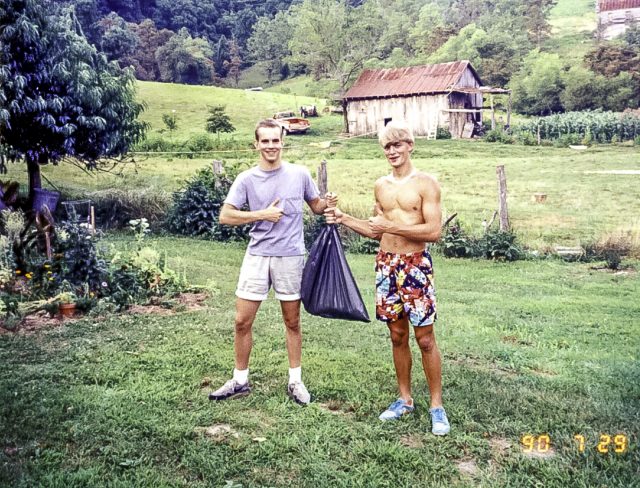
All told, we killed three raccoons that afternoon and earned the gratitude of both Ma and Pa. And we had a hell of a good time.
I’ve long ago lost touch with M. I last saw him in 1998 during the summer I came home after two years in Poland and one more year waiting. He’d made some bad decisions, and the place of our meeting was something out of an O. Henry short story. After that, we corresponded a few times, but the last we communicated was in late 1999.
That was almost thirty years ago now, and I still think back on that day fondly. Not because of the death we dealt but because of the innocent friendship lost. I don’t feel guilty for killing those ‘coons, though: they were doing real damage to the garden, and we took care of the problem in the country-folk way. Sure, we probably could have trapped them and released them somewhere else, but Pa was not a sentimental man, and he would have regarded that as a waste of time.
Years later, I thought of this day when I read the poem “The Early Purges” by Seamus Heaney:
The Early Purges
I was six when I first saw kittens drown.
Dan Taggart pitched them, ‘the scraggy wee shits’,
Into a bucket; a frail metal sound,Soft paws scraping like mad. But their tiny din
Was soon soused. They were slung on the snout
Of the pump and the water pumped in.‘Sure, isn’t it better for them now?’ Dan said.
Like wet gloves they bobbed and shone till he sluiced
Them out on the dunghill, glossy and dead.Suddenly frightened, for days I sadly hung
Round the yard, watching the three sogged remains
Turn mealy and crisp as old summer dungUntil I forgot them. But the fear came back
When Dan trapped big rats, snared rabbits, shot crows
Or, with a sickening tug, pulled old hens’ necks.Still, living displaces false sentiments
And now, when shrill pups are prodded to drown
I just shrug, ‘Bloody pups’. It makes sense:‘Prevention of cruelty’ talk cuts ice in town
Where they consider death unnatural
But on well-run farms pests have to be kept down.
Today, the Boy made his first kill. Birds were in our blueberry bushes, and the Boy had his bb gun. Somehow, he was close enough that one shot dropped a robin that was making an evening snack of our still-unripe berries.
The Girl was furious about it. She was literally in tears, shouting at him that he had no right to kill an innocent bird that had done nothing to us.
“In this time of the pandemic, we have to share,” she muttered as we ate dinner — fish our neighbor caught a couple of weeks ago when the governor let boat ramps open again before reclosing them due to a general failure to follow the newly-established guidelines.
I didn’t point out the obvious irony, nor did I point it out when she popped chicken nuggets into the toaster oven for her evening snack.
Training
The other day was Clover’s birthday. I think it was her birthday. L insists — positively and passionately insists — that it is the 21st of May. Or the 20th. Or maybe it was the 19th. I’m not sure. I’m not sure about her certainty. But we celebrated Clover’s third birthday this week nonetheless by getting her an agility course.
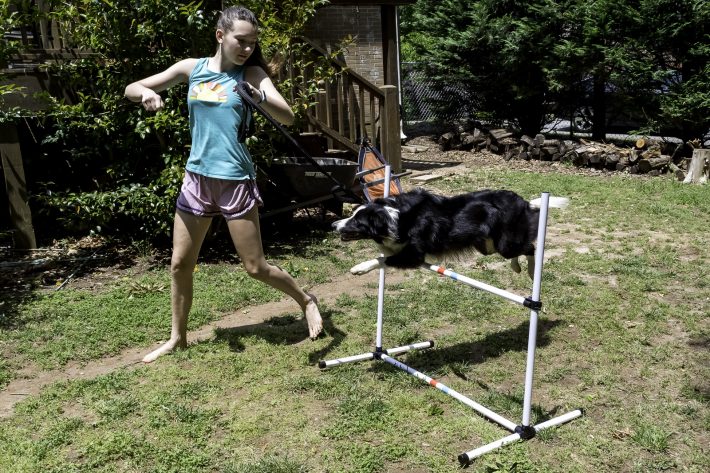
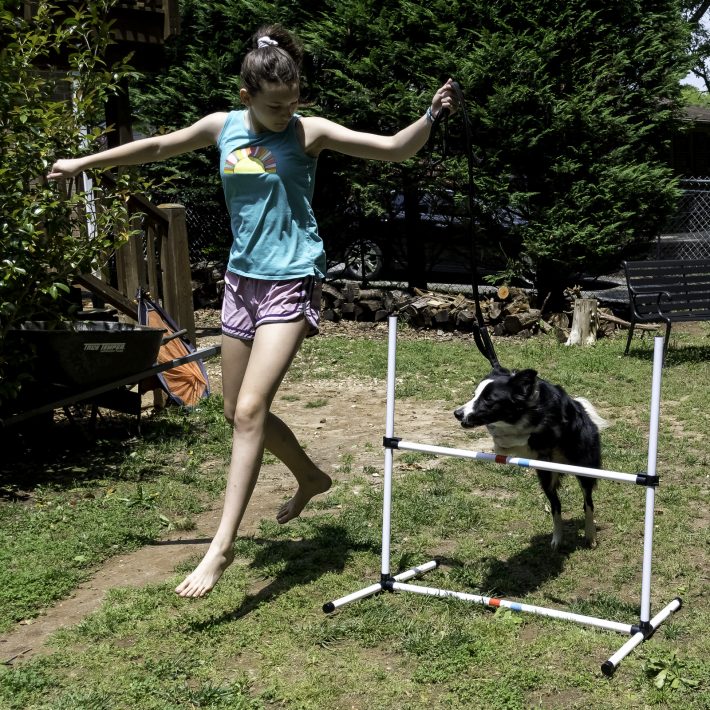
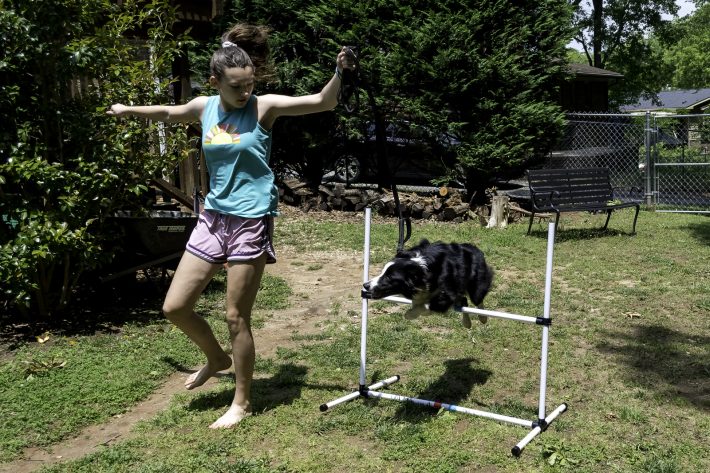
She’s already got a few new tricks up her, well, I guess tangled in the long hair on her hindquarters. (Cliches sometimes break down, I suppose.)
Exploring
E talked K into doing a little exploring after dinner. While K was still in her good clothes.
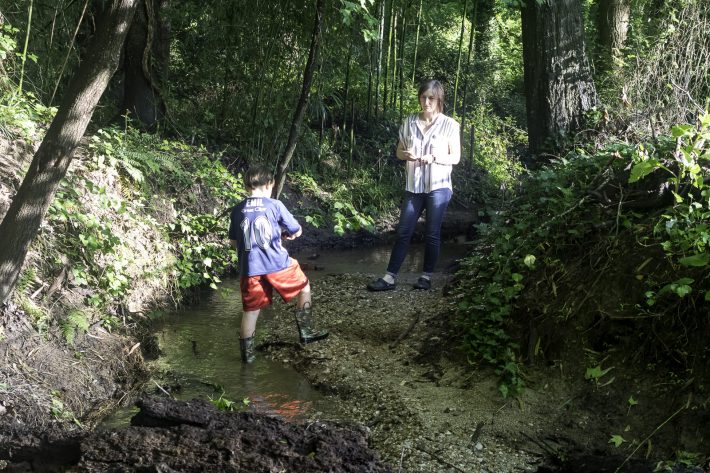
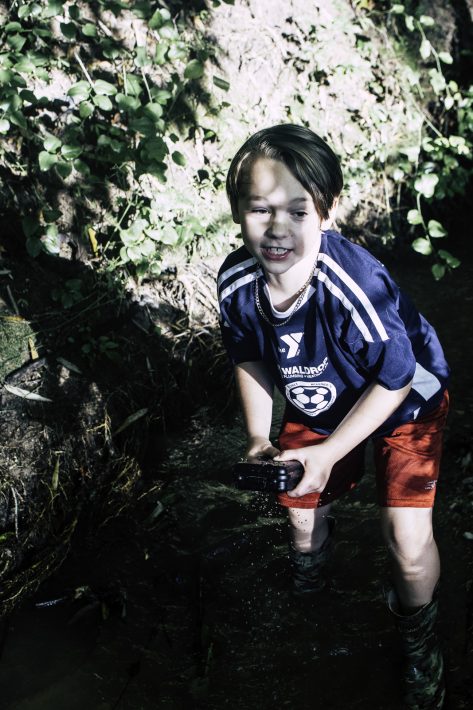
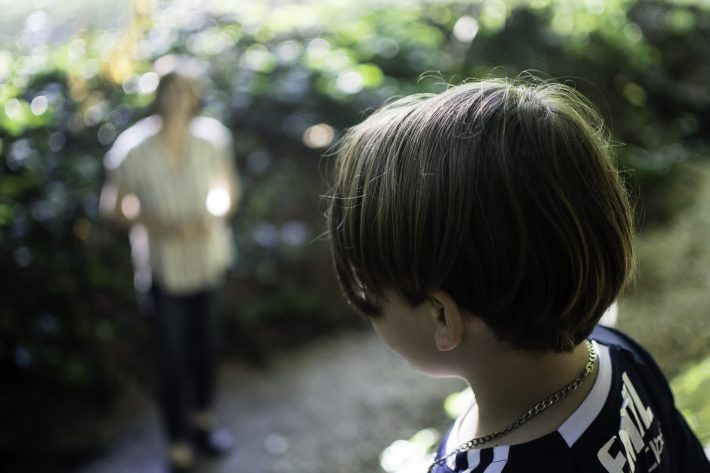
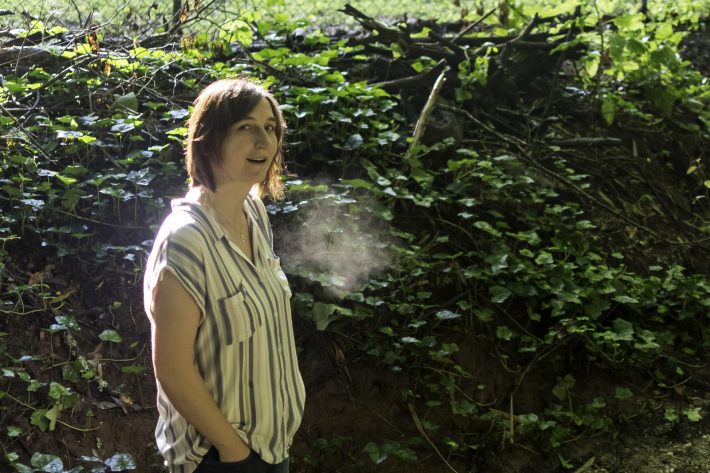
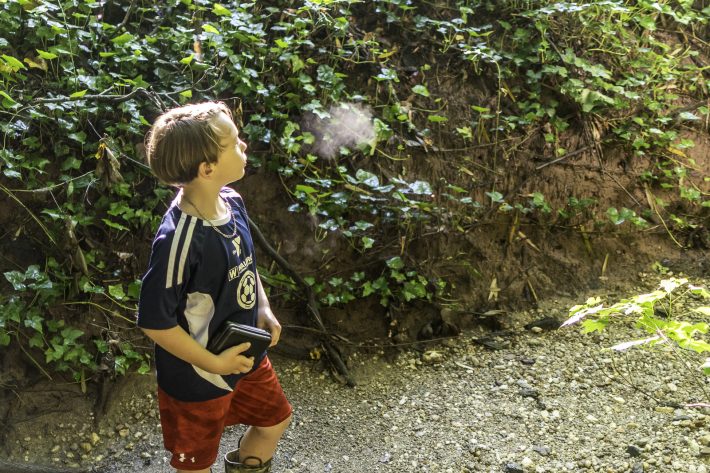
He was keen to show her how the plastic box his survival gear came in is, in fact, watertight.
Day 67: Cleaning, Surveying, Surviving, and Commenting
Cleaning Out
The end of the school year always brings a lot of cleaning and paperwork. We have an entire list of things we teachers have to do before going home for the summer.
- We have to return materials to the media center.
- Emergency guides need to go back to an administrator.
- We have to make it easy for everything to be removed from our room, so that usually means packing up all the books on my bookshelves and storing them somewhere.
- The plant engineer needs to check our room for any issues that will hamper the cleaning of our room over the summer.
- We have extensive checks about grades as well as reports we have to print out for the office staff in case there are any questions about grades over the summer.
- We have to return our keys to the a designated administrator.
- We have to return our receipt books to the accountant.
- We have numerous meetings about various things, some of which feel incredibly important and some of which feel not so important.
- Prepare letters to go home with final grades.
The first year I was a teacher at this school, it took three days to get everything ready because, in addition to all this (and a lot of stuff I’ve forgotten/neglected to mention), we had to put copies of the final report cards in permanent records and then organize the permanent records based on which high schools students were attending. These last two steps are now out of our hands, but it still takes a while to get all this done.
Part of the challenge is getting signatures. At the end of the whole process, we are to provide the principal with a checklist that has been initialed by everyone involved to show that we’ve done all the steps above. Sometimes, it’s a bit of a trick tracking down a given administrator.
I went to the school today for the end-of-year checkout, arriving at around ten in the morning, and by twelve, I was done.
This is just another way that this year is exceptional.
I’m not complaining: I didn’t have to move my books at all because the custodial staff, in an effort to get a head start on the summer’s duties, has already cleaned my room, most significantly the floor (cleaned and waxed). Turns out they just worked around the bookshelves. The curmudgeon in me will forever after complain, “Why can’t you just do that every year? It’s not like I ever move my room around — everything goes back to the same place, year after year.” Still, I would have preferred a regular ending to this year, and for that, I would have willingly done the whole check-out procedure — twice, if necessary.
Surveying the Changes
Every time we have a significant rainfall that results in the creek behind our house rising to food or near-flood levels, the Boy and I like to go out and see what has changed. The surging waters bring new flotsam and jetsom after it washes away existing flotsam and jetsom.
It changes the flow of the creek, too. For example, the spot where we usually cross was just wide enough that I could step over it with one stretching step. Now it’s much wider. As I was wearing tennis shoes during our afternoon adventure, I was unwilling to take the chance of getting them wet. The Boy kindly built a stepping pylon out of the bricks we’d brought down last year to help with the crossing in another spot.
During our exploring, the made a grisly discovery: the raccoon we thought was just inexpertly hiding the other day was in the same spot.
“So it died there?” the Boy asked. “Did it attack something there? What could kill a raccoon?!” He related some video he’d watched in which a farmer explained how raccoons killed some of his chickens. “It would have to be something really big to take down a raccoon!” I could see the wheels turning: he was thinking about what type of enormous preditor could be lurking in that wooded area we explore with seemingly careless abandon.
I suggested that perhaps it was just sick and crawled in there to die.
“Or maybe the snake we saw bit it and that’s where it died,” the Boy intelligently suggested.
That sounds reasonable.
Survival Gear
The Boy is into survival skills. He’s been watching a couple of YouTubers who do survival stuff as their main content. The primitive building of two weeks ago, with plans to build a vast underground bunker complete with swimming pool — forgotten. Completely. Not a word about it.
He used some of his money this week to buy a survival kit.
He just had to try out the saw today.
The Comment
A former student shared a video on social media. I watched about 5 minutes of it. Bill Gates and 5G networks are conspiring to spread the virus. I made a comment: “This is just getting ridiculous.”
“Why?” someone asked.
My response was admittedly a bit barbed: “If I have to explain it, there’s no point. You’ve swallowed the conspiracy theory Kool-Aid.”
My former student took me to task:
You wrote something is ridiculous without explaining why, so it’s normal to ask ‘why?’
What did you think was ridiculous? Which one of the statements that this parliamentarian was providing was ridiculous? I know we don’t hear these statements in MSM but I think that it’s better to check all information available before ridiculing anyone. It’s too easy to discredit something just because it sounds ridiculous. There were many things in history that sounded absurd to many and yet with time they proved to be true.
Anyway wherever the truth is, it’s always a good idea to ask questions and there can be nothing and no one that should be unquestionable.
After the comment, I went back to watch the video, only to find it had been flagged by fact-checkers. I simply pointed them to a couple of articles and left it alone.
What I wanted to say:
- “What did you think was ridiculous?” The whole thing. The idea that someone could possibly take this nonsense seriously.
- “Which one of the statements that this parliamentarian was providing was ridiculous?” Every single one of them. Each sentence that came out of the woman’s mouth. They’re all demonstrably false and completely illogical.
- “I know we don’t hear these statements in MSM” — there’s a reason for that: it’s called presenting facts as opposed to obviously false, idiotic statements. It’s like the old joke: there’s a name for alternative medicine that works — medicine.
- “but I think that it’s better to check all information available before ridiculing anyone.” Point taken. Now, go check the facts.
- “It’s too easy to discredit something just because it sounds ridiculous.” At least you’re admitting it sounds ridiculous. That’s a start.
- “There were many things in history that sounded absurd to many and yet with time they proved to be true.” Other than quantum theory, name one.
I should be used to this kind of nonsense now, but I’m not. Nor should I be. It’s normal now but it shouldn’t be.
Day 66: Morning Ignorance of the Below and Above
Morning
The morning, post-breakfast ritual during this time of lockdown and isolation:
The Boy works on his schoolwork. We try to pace it: whatever’s going to be more challenging for the day we tackle first. Lately, things have been fairly balanced: everything has been much easier, in short. Still, old habits persist, and he’ll start fussing if he gets the slightest bit frustrated some mornings.
Today, we made it through everything fairly quickly with minimal fussing.
Papa often takes a nap. He doesn’t necessarily intend to take a nap — he’s just comfortable, full, content, watching television or listening to a book, and what else is there to do?
K works on emails for her real estate clients. She’s trying to work two jobs now. We all tell her that she needs to focus on one or the other. We know which one she’d like to focus on. We also know that that job doesn’t have a set pay schedule.
I am usually either helping the Boy or working on my own school work downstairs. Or as in this case, taking pictures.
The Girl — well, she does what a teenager does best.
Below
Ever since we had our first flood in the basement several years ago, a heavy rainfall makes me just a bit nervous. I look at the puddles forming in the backyard. I check the weather. I duck into the crawl space to look in the sump pump basin. I repeat the cycle. I worry, worry, worry. Until our big flood in February, I’d gotten to the point, though, that I really fretted very little. It had gotten a little wet but it hadn’t flooded flooded. Still, I’m always probably going to be a little worried about water coming up from below, the hydrostatic pressure building to the point that it forces water through the smallest of cracks and starts filling our basement again. It will happen. And though I have taken steps to remediate the situation, there are no more steps I can take that don’t involve massive work and a sizeable fiscal commitment.
Option 1
Our neighbor up the street had a drainage system put in his basement recently: around the entire parameter of the basement, workers busted up the concrete and the applied perforated drain pipes that lead to a central sump pump. It was a five-figure job.
That might be the next step if the basement continues flooding. It’s the type of job that, having the summer off every year, I’d be keen on tackling myself. At the very least, I could rent a jackhammer and bust up the concrete and dig down to the footer, cutting the cost significantly, I would think. Or at least hope.
Option 2
The other option: when we pull out the landscaping front of the kids’ bedrooms, I could dig down to the footer there and re-seal the foundation, perhaps installing a French drain system there while everything is dug up.
And Above
I was playing pool with a friend in the basement probably almost decade ago when water started pouring onto the pool table. It turned out that the shower pan in the master bathroom had failed.
We ended up renovating the whole bathroom as a result.
There was one other time when the water came from above instead of below: somehow, the water came in between the upstairs deck and the door sill and started dripping from the top of the door in the basement. I never figured out what caused that, but I caulked well around the door and it never happened again.
But most of our experience with water entering the house comes from below.
But tonight, the Boy was getting ready for his bath when he looked up and asked, “Daddy, is that a leak?”
Shit.
I went to get a chair so I could reach up and feel the dampness I knew would be there. Still, as I walked to the Boy’s room and returned with the chair, I found myself thinking, “Please, oh please just be a dark spot on the ceiling that I’ve never noticed though we’ve lived here almost thirteen years.”
I looked carefully at where the stain was and realized quickly what had likely happened: the roof vent flashing had somehow failed. Perhaps it had gotten cracked. Perhaps it was torn. Perhaps, perhaps, perhaps.
“Maybe it’s just running down the sewer vent,” I thought.
I climbed on the roof to see if anything was amiss. “Perhaps the hail we had a few days ago damaged something and insurance will pay for an entire re-roofing job,” I thought both hopefully and sickeningly. Examining the flashing, I couldn’t see any sign of compromise. We covered it with some plastic and hoped for the best.
Still, I needed to check in the attic to see just how bad the problem was.
I don’t really know if that’s bad or not. Part of me says, “That’s horrible: it’s bad enough that it’s saturated the ceiling sheetrock enough to make a stain.” And yet, I really don’t know.
So tomorrow we’ll call the insurance adjuster and a roofer to see what they say.
When I got back down and talked to K about what I found, the Boy discovered my boots and couldn’t resist.
Later in the evening, K thought the spot is damper than it was earlier. We decided to go all out: we brought out the two tarps we use for camping, overlapping one with the other so that water can run under the tarp, weighing the whole thing down with bricks and cinder blocks. And doing all this in a light rain. At 10:30.
Lightroom Revisit
In August 2003, K and I rode our bikes south through Slovakia to Hungary to spend a week in Budapest. When we returned, we rode to Sturovo, a town in southern Slovakia, where we caught a train to Zilina, where we waited for another train to Trstena, just across the border from where we lived in southern Poland. We had to wait in the Zilina train station for most of the night to catch the 5:00 a.m. train to Trstena. This guy was waiting for a train, too.
This is one I’m particularly pleased with the Lightroom reworking. The before-and-after shows how much of a difference it makes to do selective editing:
Day 65: Inferring in the Rain
Inferring
Authors often say a lot without saying much. A good author leaves a lot for the reader to piece together for herself, and that’s one of the things that can make a book engaging. But filling in those gaps is a skill that readers must learn. It doesn’t come naturally.
This is one of the things I spend a lot of time and energy teaching my eighth graders how to do. The honors kids are usually fairly adept at it, but the on-level students often struggle. I have to model it for them, doing think-alouds in which I say aloud all the inferences that are running through my head when I read. I infer; I predict; I connect to previous knowledge; I comment on what I read. I model, model, model, then turn it over to them to try as a class before they try it in groups and finally as individuals. Scaffolding, that’s called: model it, practice as a whole class, practice in groups, practice individually — the bread and butter of my teaching.
Tom Sawyer is providing ample chance for me to begin exposing the Boy to this kind of critical thinking.
Presently [Aunt Polly] stepped into the kitchen, and Sid, happy in his immunity, reached for the sugar-bowl — a sort of glorying over Tom which was wellnigh unbearable. But Sid’s fingers slipped and the bowl dropped and broke. Tom was in ecstasies.
I pause: “What do you think will happen?” I ask the Boy.
“Aunt Polly will think that Tom broke the sugar bowl,” he said after a moment’s thought.
“Right. That’s called predicting…” I begin.
“I know, Daddy. You tell me that every time we read something.” Perhaps not every time, but often enough.
We continue:
In such ecstasies that he even controlled his tongue and was silent. He said to himself that he would not speak a word, even when his aunt came in, but would sit perfectly still till she asked who did the mischief; and then he would tell, and there would be nothing so good in the world as to see that pet model “catch it.” He was so brimful of exultation that he could hardly hold himself when the old lady came back and stood above the wreck discharging lightnings of wrath from over her spectacles. He said to himself, “Now it’s coming!” And the next instant he was sprawling on the floor!
“What does ‘sprawling’ mean?” the Boy asks.
I explain, then ask, “Do you understand what happened?”
There is a lot going on in that passage, particularly in the final two sentences: “He said to himself, ‘Now it’s comin!’ And the next instant he was sprawling on the floor!” Missing from this is the fact that Aunt Polly slaps Tom so hard that it knocks him off his chair.
I explained it to the Boy. He thought it was horrible that someone would slap a child so hard that it knocks him out of his chair. I think that’s a fairly reasonable concern, to say the least. Why do we adults find that passage funny, though? I think it’s because of all the work Twain makes us do, all the thinking, all the blanks we fill in. Twain is a master of implication.
In the Rain
It rained all day today. K and I were concerned that it might turn out to be enough to threaten our basement again. Granted, I have filled all the termite treatment holes with hydraulic cement: those holes shouldn’t let any more water into our basement, let alone the geysers and fountains that were gushing in during our last storm. And the crack by the fireplace? I drilled it out completely and patched it with more hydraulic cement.
So part of me was thinking, “Okay — bring it on. Let’s see if I’ve got you licked” (to employ a usage from Tom Sawyer that still tickles the Boy).
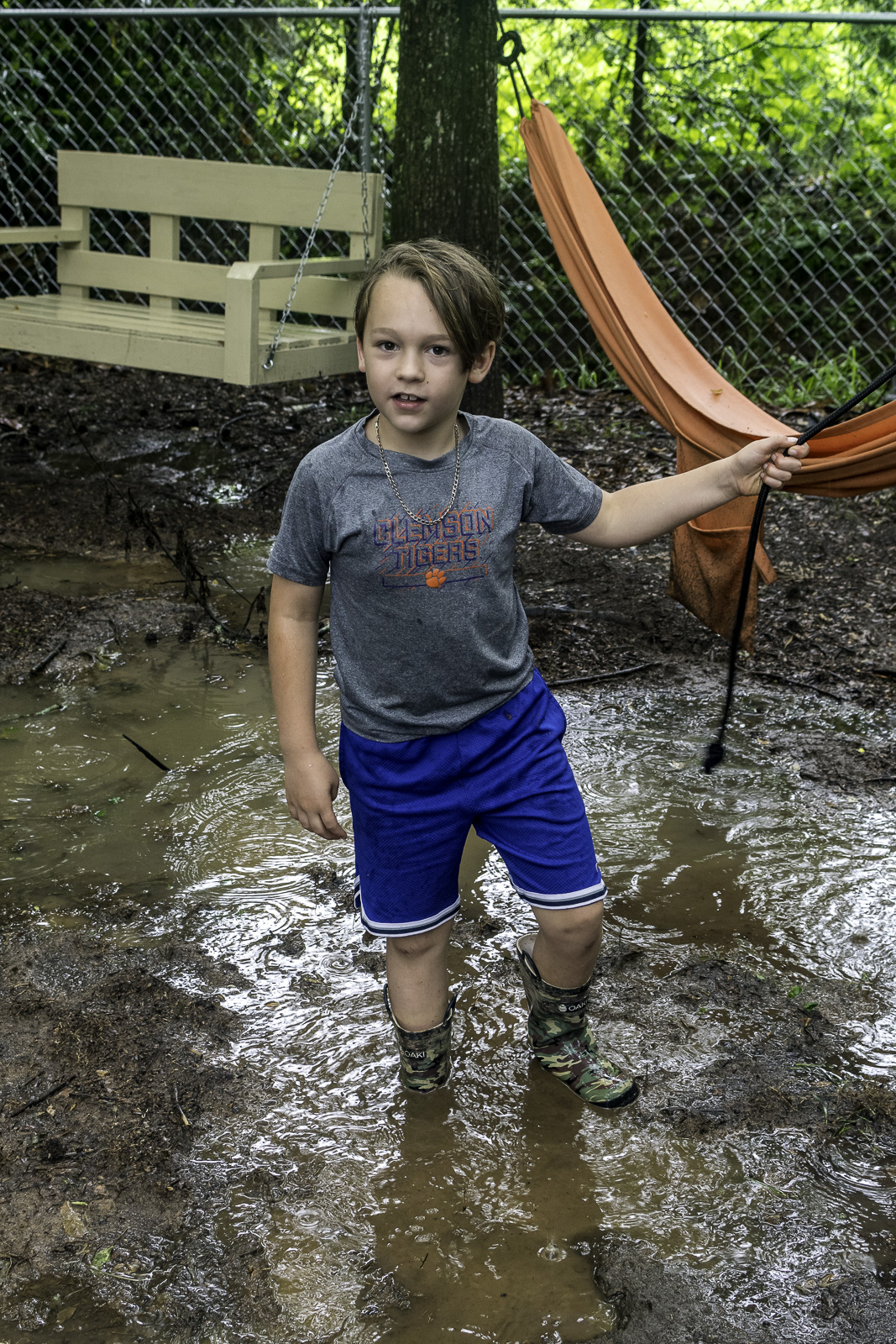
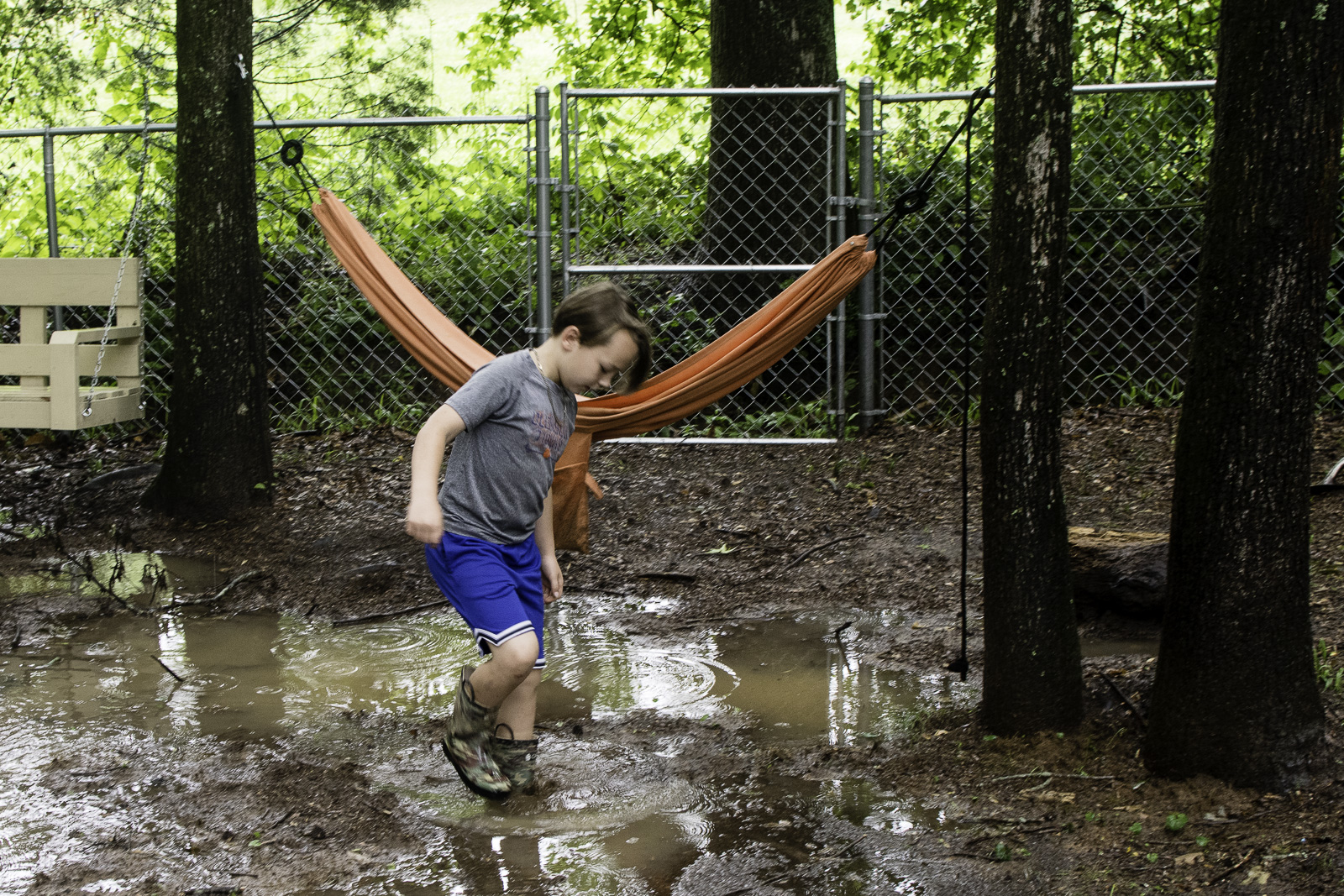
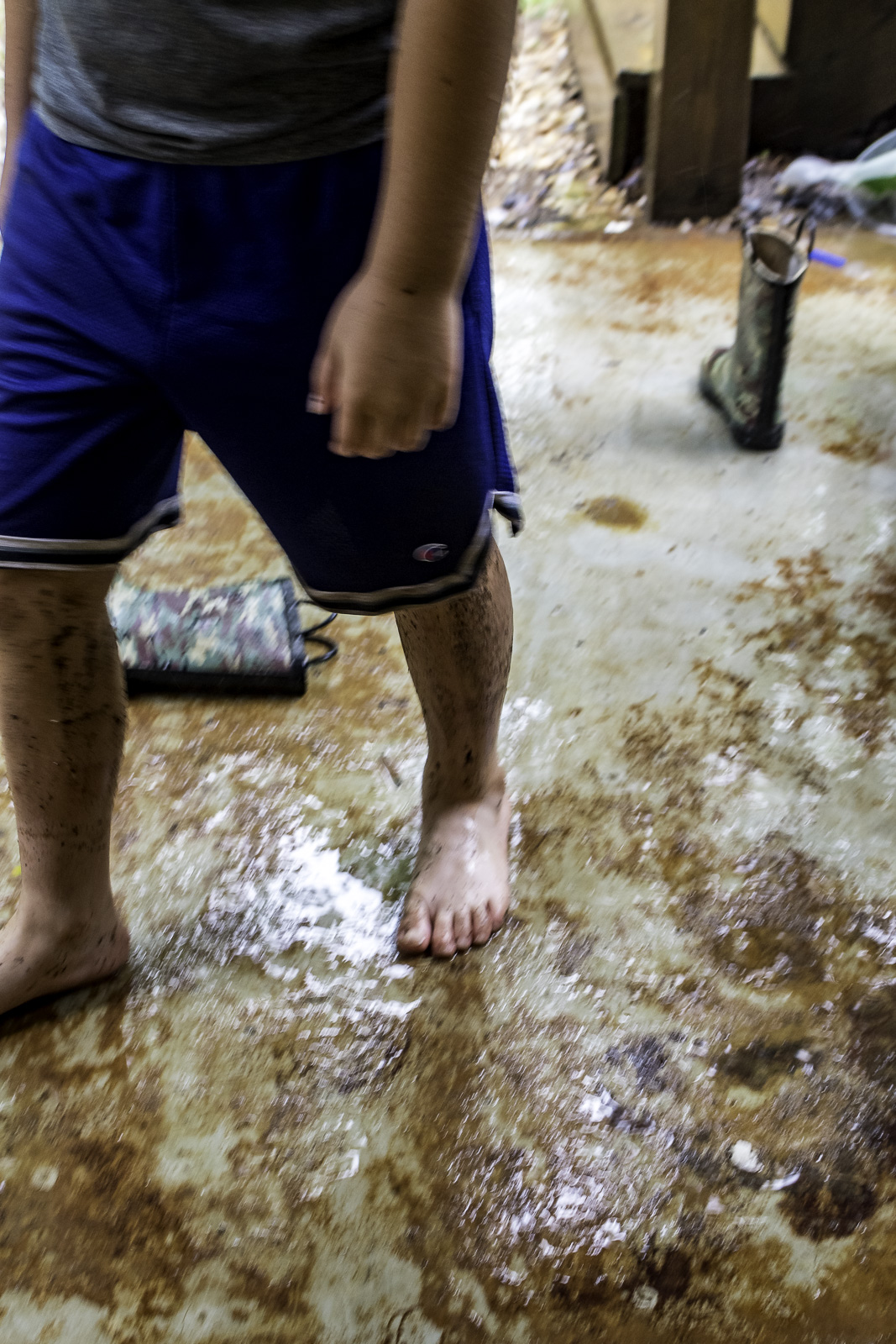
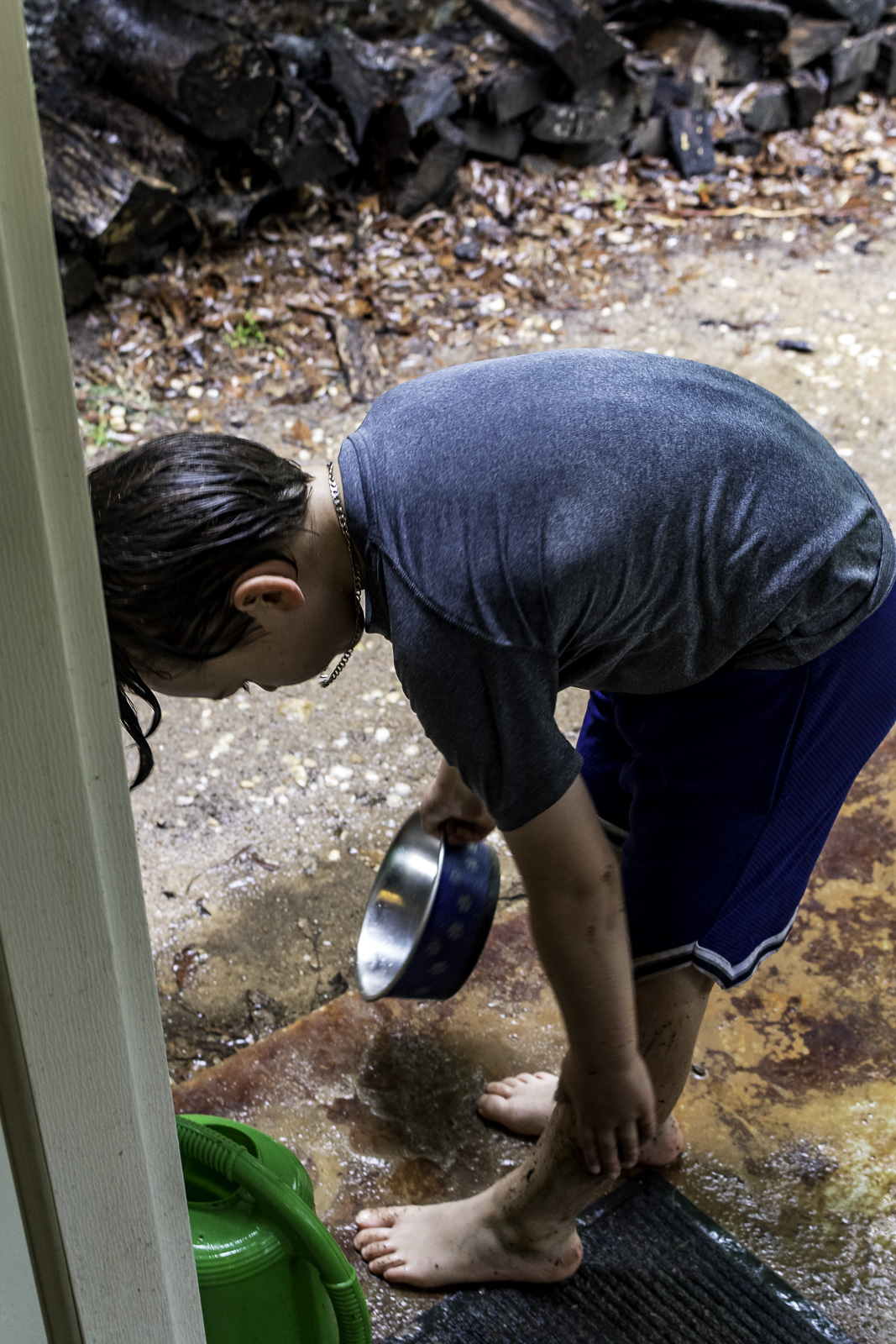
But most of me was just hoping that it didn’t come to that. When the Boy and I headed out in the morning to see how much rain had fallen, things were looking bad but not dreadful.

We went back out in the afternoon after more rain. We went ahead and crossed the creek at this point like usual: the water was only a few inches above our feet. I held the Boy’s hand, and we ventured up a bit further. The rain continued, and by the time we made it back to this point, the water was waist-deep for the Boy. I held his hand firmly, and we made it across easily, but it was a lesson: “See how quickly the water can rise?” That’s the epitome of flash-flooding.
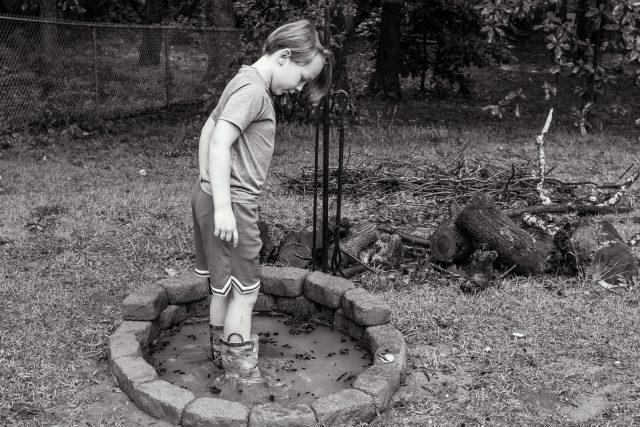
Scare Politics
I noticed this particular meme this evening on social media:

I find it hard to imagine what kind of simplistic thinking could lead to something like this. Surely no one so naive as to believe that it’s as simple as this meme suggests. To think that we could go from Trump-istan to this worst-case-scenario, utterly exaggerated vision of progressive ideas run amuck in one election cycle — I just don’t get it.
What I do get is the fear buttons this kind of meme pushes. The left has their own versions of these memes, of course. I could probably browse the tweets of friends who lean much further to the left that an avowed centrist (don’t we all see ourselves as centrists? no — we certainly don’t) like me and find the equivalent: we’re one step away from living in a real-life Handmaid’s Tale. (Come to think of it, I believe there was a protest with women dressed as handmaids from the novel/movie/series.) Making decisions from fear is bad enough, but making them from a sense of fear that might very well have been intentionally manipulated — that in itself is terrifying.
The Dog
Two things: how can a dog get that dirty in a matter of seconds? And how can it seem to disappear as soon as she’s dry?

Day 64: Working, Ending, and Reading
Working and Ending
We’re nearing the end of the year — only a couple of weeks to go. These weeks promise to be anything but typical. For one thing, I’m giving assignments with the understanding, on both sides, that I will provide minimal feedback and that the grade depends more on effort than accuracy. That’s the district policy during our quarantine teaching. It might be the state policy. So some kids do their absolute best, like this analysis of chapter 24 of To Kill a Mockingbird:
Chapter 24 is important because it shows how the town of Maycomb isn’t as “Christian” or as “nice” as they claim to be. For example, Mrs. Farrow Mentions how they can educate them and try to make them Christians but till there will be, “no lady safe in her bed.” The antecedent ambiguity that Mrs. Farrow makes using “them” as in the African Americans shows a sense of judgment she has towards them. Not only that but when she mentions how much they are fighting a losing battle and women still can’t be safe shows the hierarchy these white people have put themselves in showing that no matter what an African American will never be better as a person of white ethnicity. Similarly, Merriweather states how there are some, “Misguided people” in the town who think they were “Doing right”, but all they did was “Stir [them] up.” This second case of antecedent ambiguity this time towards Atticus shows the real hypocrisy of Mrs. Merriweather. Mrs.Maudie backs that up with a remark showing how Mrs. Merrieweather doesn’t feel any ounce of remorse talking trash, but eating Atticus’ food. Showing how really bad Mrs. Merriweather actually is.
Other students don’t turn in anything. Despite calls to parents. Despite emails. Despite encouragement. Despite the constant reminder that this the only time they’ll have to pull in a handful of 100s (nine of them, in fact) for simply doing the work. Just putting forth the most minimal effort. It’s frustrating, not to mention tiring.
The Boy, though, gets no mercy. Just try to skip something, or not do his absolute best — K is on him to get everything done, and when she’s not, I am. Truth be told, though, she’s done the lion’s share of the work with him — probably something like 95% of the work with him even if I’m being generous with myself. I have spent most of that time in the basement, “grading” things, sending emails, planning things, meeting on Google Meet. She has kept him on his toes, kept his nose to the cliche grindstone, which means she’s been keeping her own to the grindstone as well.
I am usually keeping my own students’ noses to the cliche at this time of year, especially the English I students. They’ll soon be writing their letters to next year’s students, and I have to make sure their final impressions of the class will help them create the appropriate first impressions in next year’s classes. They’re usually finishing up Great Expectations or Lord of the Flies at this point in the year. They’re out of breath, academic legs aching, making the last mad dash for the finish, and I’m there cheering them on and behind them whipping them faster, mixing metaphors left and right. The letter is supposed to be completed in one class period. That’s what makes it so impressive to the students next year.
“How would you rate this letter’s organization?” I ask. They usually are moderately impressed.
“How would you rate this letter’s length?” I ask. They usually are moderately impressed.
“How would you rate this letter’s persuasiveness?” I ask. They usually are moderately impressed.
“Last year’s students wrote these letters in one class period. These are, therefore, first drafts.” I pause for effect. Everyone begins looking at each other. “Whose opinion of these letters has risen noticeably?” Every hand — every single one — goes up.
And this year? How can I make sure each student only spends the equivalent of one class period on her letter? In short, I can’t.
Not the end of the world, but frustrating.
Reading
E and I finished Twenty Thousand Leagues Under the Sea last night. After complaining about how he didn’t understand everything for the last couple of weeks, he changed his tune when I realized we wouldn’t find out what happened to Captain Nemo.
“Is there a sequel?”
“I think there is. Or at least he appears in another book,” I say.
“Can we read it?”
No — not now. Enough Jules Verne for now.
Our next book: The Adventures of Tom Sawyer. We begin with a history and culture lesson: I talk to the Boy about the n-word. It appears in the book. There’s no escaping it. He’ll encounter it in one way or another soon enough.
Then we begin reading. I’m hoping he’ll find it amusing. If he doesn’t… well, I guess we’ll have to try something else. But soon enough, he’s laughing:
The summer evenings were long. It was not dark, yet. Presently Tom checked his whistle. A stranger was before him—a boy a shade larger than himself. A new-comer of any age or either sex was an impressive curiosity in the poor little shabby village of St. Petersburg. This boy was well dressed, too—well dressed on a week-day. This was simply astounding. His cap was a dainty thing, his close-buttoned blue cloth roundabout was new and natty, and so were his pantaloons. He had shoes on—and it was only Friday. He even wore a necktie, a bright bit of ribbon. He had a citified air about him that ate into Tom’s vitals. The more Tom stared at the splendid marvel, the higher he turned up his nose at his finery and the shabbier and shabbier his own outfit seemed to him to grow. Neither boy spoke. If one moved, the other moved—but only sidewise, in a circle; they kept face to face and eye to eye all the time. Finally, Tom said:
“I can lick you!”
“I’d like to see you try it.”
“Well, I can do it.”
“No you can’t, either.”
“Yes I can.”
“No you can’t.”
“I can.”
“You can’t.”
“Can!”
“Can’t!”
The Boy is laughing so hard by the time we get here. We reenact the dialogue a number of times, each time to more uproarious laughter. I’m not sure what he finds more amusing: the idea of “whip” meaning “to beat up” or repetition of assertion and denial.
We continue:
An uncomfortable pause. Then Tom said:
“What’s your name?”
“’Tisn’t any of your business, maybe.”
“Well I ’low I’ll make it my business.”
“Well why don’t you?”
“If you say much, I will.”
“Much—much—much. There now.”
The whole “much-much-much” just about doubled him over. It’s what an eight-year-old might do, after all.
After his evening dental hygiene session (what a way to describe an eight-year-old boy brushing his teeth), we embark on chapter two, the most famous of all Twain’s passages: the whitewashing scene.
Tom gave up the brush with reluctance in his face, but alacrity in his heart. And while the late steamer Big Missouri worked and sweated in the sun, the retired artist sat on a barrel in the shade close by, dangled his legs, munched his apple, and planned the slaughter of more innocents. There was no lack of material; boys happened along every little while; they came to jeer, but remained to whitewash. By the time Ben was fagged out, Tom had traded the next chance to Billy Fisher for a kite, in good repair; and when he played out, Johnny Miller bought in for a dead rat and a string to swing it with—and so on, and so on, hour after hour. And when the middle of the afternoon came, from being a poor poverty-stricken boy in the morning, Tom was literally rolling in wealth. He had besides the things before mentioned, twelve marbles, part of a jews-harp, a piece of blue bottle-glass to look through, a spool cannon, a key that wouldn’t unlock anything, a fragment of chalk, a glass stopper of a decanter, a tin soldier, a couple of tadpoles, six fire-crackers, a kitten with only one eye, a brass door-knob, a dog-collar—but no dog—the handle of a knife, four pieces of orange-peel, and a dilapidated old window sash.
The idea of “a dead rat and a string to swing it with” was just terribly amusing for the Boy.
As he was drifting off to sleep, he remembered another favorite line — once I explained key vocabulary — and muttered it one last time: “would have bankrupted every boy in the village.”
Day 63: First Mass
Day 62: Camping in the Backyard
We’ve gone camping as a family quite a few times: Stone Mountain, Deep Creek, Lake Jocassee, and Huntington Beach come immediately to mind. Memorial Day was always a great weekend to go camping, and we went most often to the beach. But then life got complicated, family got sick, schedules changed, and responsibilities grew so that now, even if there weren’t a pandemic to worry about, we would not be able to go camping as a family for quite some time. For how long? We really don’t know.
The Boy, though, wanted to go camping. So we did the obvious thing last night: we pitched a tent in our backyard and spent the night in it. There — camping.
Well, not quite. We took our pillows down with us. Somehow, we never remember to bring our pillows — or any pillows really — when we go camping.
Also, I went in to get E’s blanket in the middle of the night when I woke to find him only barely covered with the sleeping bag because he was sleeping under it instead of in it.
And we didn’t have to strike camp this morning. We just left it up, thinking we might go camping again.
Finally, and most significantly for me, I took a shower without flipflops this morning.
Yesterday afternoon, we also put up K’s new swing. It’s hanging a little wonky now, and I didn’t have a chance to figure out today why, but it’s there. And the dog even likes it.
As for today, other than the single picture from this morning, I never had occasion to take out the camera. Who wants to see pictures of bathrooms in the midst of weekly cleaning or the crawl space as I examine the water pipes to try to figure out why they’re banging and knocking?
Day 61: Fear, Faith, and Fun
Fear and Faith
Imagine fear nestled into anxiety burrowed into terror, and all of that is supposed, in the end, to be a source of great joy. “In my beginning is my end” T. S. Eliot wrote, but for some evangelical Christians, it might be reworded, “In my anxiety is my comfort,” for they view their everyday reality through an apocalyptic lens. They post things like this on social media:
The single comment “Scary” reveals the paradox at the heart of this line of thinking.
On the one hand, there is a sense of terror at what’s coming. Such believers look at the Bible as a roadmap for the future, seeing all sorts of ideas that, to those of us on the outside looking in, seem patently ridiculous. They see a coming world-engulfing violent cataclysm that will wipe out wide swaths of humanity and subject the survivors to near-slavery under the rule of some world-dominating ruler known simply The Beast, who will rule in what they call The Tribulation. During this time, there will be mass executions of believers and worldwide oppression.
At this point, the vision starts fracturing. What will happen to Christians, to good Bible-believing Christians who saw all this coming and gave themselves over to the Lord long ago? Some suggest that these poor Christians will have to go through all this; others (most) believe firmly that they’ll all be whisked away to heaven before all this — the rapture.
I grew up being taught that, like the rapture, God would supernaturally protect all his faithful Christians from this onslaught of literal hell on earth, but instead of being taken away into heaven, we would escape to a location of protection, which got the name the Place of Safety. Our religious leader conjectured it would be in Petra, Jordan. There we would spend the three-and-a-half years that the devil, through his Beast, would rule and torment the world, emerging at the end when Jesus returns to put the devil in his place and us in charge of rebuilding the world. Sounds crazy — but not any crazier than being whisked away like the Left Behind book series narrates.
Whatever the belief, though, these groups have one thing in common: the believers — the right-believing faithful — will be saved. This, then, should be a time of joy for such Christians. The end is almost here, and because they believed the right things all these times, they won’t have to endure the horrors coming.
So why the fear? Just look at the thoughts that follow the original “Scary” comment:
These poor folks are genuinely scared about Bill Gates’s supposed plans to use this pandemic and the resulting vaccine, which they fear will be mandatory (which it should be), to implant chips into them.
There is an amusing irony in all this, though:
“The COVID-19 vaccine is a trick so they can put a tracking chip in your body!” they furiously tweet out from the tracking device they willingly carry everywhere in their pocket.
— Faith Naff 🏳️🌈🏳️⚧️🌹🦋 (@FaithNaff) May 9, 2020
Such a strange mix of confusion, and it’s driving thousands upon thousands to outright terror.
There is, of course, one thing that these fear-stricken Christians can do: they can pray about it.
Yet what is the effectiveness of this prayer? This verse from the Bible promises that “if my people, who are called by my name, will humble themselves and pray” that God “will heal their land.” If that doesn’t sound like a promise from omnipotence that is directly applicable to our current situation, I don’t know what does.
But we’ve tried this before:
— Richard Dawkins (@RichardDawkins) April 4, 2020
These Christians will point out that there are conditions: the petitioners must “turn from their wicked ways” before this promise will be fulfilled, so that’s probably the problem: America is still aborting pregnancies, fornicating, and tolerating homosexuality (the three biggies), so God is just waiting for that to stop.
On March 30 televangelist Kenneth Copeland must have decided he would not wait for the stubborn, God-hating Americans to repent and simply “exercised judgment” on the pandemic, thus ending it:
But four days later, he realized he had to try again:
And yet it’s still not over.
Here’s where another layer of anxiety enters: these poor souls must be wracking their brains and souls trying to figure out what they’re doing wrong. So it seems to me that this type of Christianity does not relieve anxiety but only heightens it. Instead of these beliefs calming you, they add another layer of anxiety when one’s prayer’s and petitions are either ignored or answered in the negative, and the natural response is to blame oneself: “God promised. I must have done something wrong.”
So by the time we get to this level, we have the following fears, some conscious and some less so.
- The end of the world is literally around the corner. If I’m right with God, I’ll be spared. Am I right with God?
- Even if I’m right with God, my interpretation of end-time prophecy might be a little wrong and Jesus might not return until after the tribulation. So if I go through this horror, how will I know I’ll be spared in the end?
- I know God doesn’t always answer prayers, but his Word says he will if I repent and pray, so if I or someone close to me becomes infected, I’ll pray, but it might not be his will.
- And even if it is his will, I might have done something wrong. Or my country might be doing something wrong.
For something that’s supposed to bring comfort, that’s an awful lot of sources of anxiety.
In a sense, these folks have a right to their anxiety. The First Amendment guarantees that right. But some of these anxiety-inducing conspiracy theories have long-reaching effects. They lead people to reject science for religious-based superstition:
Right-wing pastor Curt Landry tells his follower never to accept any eventual coronavirus vaccine because it’s a set-up for the Mark of the Beast: “That vaccine is from the pit of Hell. Do not pray for those vaccines, and do not take the vaccine. ” https://t.co/4oExoRqTbJ pic.twitter.com/OdePBeRaT1
— Right Wing Watch (@RightWingWatch) April 2, 2020
Conspiracy theories have been around for ages, and fundamentalist Evangelical Christians have often been particularly willing to believe them. After all, their whole religion is a conspiracy theory: the devil is constantly trying to get humans to do his bidding unknowingly. The group I grew up in went so far as to call itself the only group of true Christians in the world: the rest of the “so-called” Christians were actually worshipping a Satan-created replacement Christianity. These “so-called Christians” were, for all intents and purposes, worshiping the devil himself. But even among the milder, less cultish groups, there is a sense of conspiracy. Indeed, this conspiracy goes all the way back to the Garden of Eden, when the devil tried to usurp God’s control over humanity.
I’m certainly not the only one to notice this similarity:
Arthur Jones, the director of the documentary film Feels Good Man, which tells the story of how internet memes infiltrated politics in the 2016 presidential election, told me that QAnon reminds him of his childhood growing up in an evangelical-Christian family in the Ozarks. He said that many people he knew then, and many people he meets now in the most devout parts of the country, are deeply interested in the Book of Revelation, and in trying to unpack “all of its pretty-hard-to-decipher prophecies.” Jones went on: “I think the same kind of person would all of a sudden start pulling at the threads of Q and start feeling like everything is starting to fall into place and make sense. If you are an evangelical and you look at Donald Trump on face value, he lies, he steals, he cheats, he’s been married multiple times, he’s clearly a sinner. But you are trying to find a way that he is somehow part of God’s plan.”
So we’re at the point that we’re all living in different realities. The Atlantic has an article about this now: “The Prophecies of Q,” aptly summarized, “American conspiracy theories are entering a dangerous new phase.”
The power of the internet was understood early on, but the full nature of that power—its ability to shatter any semblance of shared reality, undermining civil society and democratic governance in the process—was not. The internet also enabled unknown individuals to reach masses of people, at a scale Marshall McLuhan never dreamed of. The warping of shared reality leads a man with an AR-15 rifle to invade a pizza shop. It brings online forums into being where people colorfully imagine the assassination of a former secretary of state. It offers the promise of a Great Awakening, in which the elites will be routed and the truth will be revealed. It causes chat sites to come alive with commentary speculating that the coronavirus pandemic may be the moment QAnon has been waiting for. None of this could have been imagined as recently as the turn of the century.
Would could imagine a scenario in which a prankster began something like Q and then it quickly gets out of hand. The prankster tries to step forward and point out that he began it all. “Look, I have evidence!” He could have even had the foresight to record everything he did on video and through screen-recording software, yet that wouldn’t be enough once the conspiracy had gained a life of its own. One can only imagine what such a prankster would feel as he watched his creation ravage reasonable — a modern Frankenstein, with the conspiracy theory being his unnamed monster.
Yet Frankenstein could reason with his creation, and in fact did attempt to talk to him. Conspiracy theories are like memes: they’re elements of the brain that are belong to no one and are somewhat self-replicating. In short, there’s no reasoning with a conspiracy theory, and there’s little ability to talk to a believer in one:
Taking a page from Trump’s playbook, Q frequently rails against legitimate sources of information as fake. Shock and Harger rely on information they encounter on Facebook rather than news outlets run by journalists. They don’t read the local paper or watch any of the major television networks. “You can’t watch the news,” Shock said. “Your news channel ain’t gonna tell us shit.” Harger says he likes One America News Network. Not so long ago, he used to watch CNN, and couldn’t get enough of Wolf Blitzer. “We were glued to that; we always have been,” he said. “Until this man, Trump, really opened our eyes to what’s happening. And Q. Q is telling us beforehand the stuff that’s going to happen.” I asked Harger and Shock for examples of predictions that had come true. They could not provide specifics and instead encouraged me to do the research myself. When I asked them how they explained the events Q had predicted that never happened, such as Clinton’s arrest, they said that deception is part of Q’s plan. Shock added, “I think there were more things that were predicted that did happen.” Her tone was gentle rather than indignant.
There’s no reasoning with them because they often don’t even see themselves as conspiracy theorists:
“Some of the people who follow Q would consider themselves to be conspiracy theorists,” [David] Hayes[, one of the best-known QAnon evangelists on the planet] says in the video. “I do not consider myself to be a conspiracy theorist. I consider myself to be a Q researcher. I don’t have anything against people who like to follow conspiracies. That’s their thing. It’s not my thing.”
So in the end, it’s hard not to be at least somewhat depressed about all this, and that in turn tends to make me just a little pessimistic about our future as a species — yet again. I can help our children develop the critical thinking skills (the painfully basic critical thinking skills) to avoid falling into this trap themselves, but that’s two in a nation of millions. These ideas are gaining momentum, and the alternative cultures they spawn are growing.
Fun
The Boy and I went out exploring again today. He had to try his new gumboots. I warned him about deep water: “If the water goes over the top of the boot, your foot will be permanently soaked.” He stepped in water that was too deep. One foot got soaked. We laughed quite a while about the squishing sounds coming from his boot.
Day 60: Eighth Birthday
A proper birthday has to start with a proper birthday breakfast and a phone call from Babcia. For E, this meant an omelette for breakfast. Never mind that this was only the second time he’s ever had an omelet, a proper omelette, but he fell in love with it earlier this week, on Mother’s Day, and decided that it was his favorite breakfast of all time. Making omelets though is a time-consuming task, so although I layered the sauteed onions, sauteed peppers, and bacon bits very carefully for the Boy, the rest of us got it all mixed up in scrambled eggs.
“I could have it that way, I guess,” he confessed. “It’s the same thing, just all mixed up.”
The phone call from Babcia was a little less fluid. E is reticent to speak Polish, so although he understands everything Babcia says, he usually responds in English then turns to K, expecting a translation. Today Babcia tried to help him out, tried to ease his anxiety. She asked him simple questions like, “Are the flowers blooming?” or “What color are the flowers?” Yet he was still reluctant to speak Polish.
School today for him was relatively simple. At first, he wanted yesterday to complete as much of today’s work in addition to yesterday’s work as possible. But yesterday in the afternoon he decided that was not the best plan after all. He was ready for some free time. This meant of course that he had all the work for today to complete.
At the beginning of this quarantine, a day’s worth of work was just that: a day’s worth of work. The amount was greater than it is now, to be sure, but he fussed incessantly how about the frustrations he was feeling, about the difficulty of the math problems, about the length of the readings. We are half expecting such antics today, interspersed with cries of, “But it’s my birthday. Why do I have to work on my birthday?” However, he plowed through his work with relative ease, making it through math, which was subtracting three-digit numbers from three-digit numbers, each problem requiring regrouping and then word problems, in less than fifteen minutes. He wrote two more chapters of his frog/toad book and was done.
In the afternoon, we headed back down to the spot where we’d caught and inadvertently killed a minnow yesterday. I thought perhaps we might have a repeat, feared it in some ways — who wants to just go around killing little fish? Yet E was keen to try again. We did try again, and caught three fish. Two of them made it back to the water fine.
One of them — well, we didn’t quite hook him in the mouth but somehow hooked him through his body. He was already bleeding when we pulled him out of the water.
While we were down there, L came to the balcony and yelled across the yard, “You guys need to come back! Now!” At first, I was afraid that something had happened to Papa. Of late he’s been spending afternoons on the deck wallowing in nostalgia by exploring songs he hasn’t heard in decades, all thanks to Spotify.
Instead, we all got a pleasant surprise:
E’s best friend’s mother drove him by our house to wish the Boy happy birthday.
As for our celebration, we played a trick on him that Nana and Papa played on me a couple of times: give him something that’s relatively worthless without the other item. Like a cable to hook up a laptop to something suggesting that it might work with an old laptop, then giving a new one as a surprise (a la Nana and Papa).
We gave him a tablet case and screen protector. He’d been asking for a tablet for some time, and we thought we’d see what would happen if he got only the empty shell. “You can keep and maybe you’ll get a tablet next year,” I suggested. “Oh, that’s great,” he said very calmly — not really upset, not really thrilled.
Then, when he opened Papa’s present, lo and behold — an Amazon Fire, just for him.
Finally, there was the cake. L began working on the cake yesterday and decided to add to it today. A two-tiered cake, each with two layers.
The slices were impressive to say the least. K and I split one: she took the top tier, and I worked on the bottom one. The Girl is getting the flavors down — she’s still not thrilled with the presentation, though.
“Patience and practice,” K said to her. Though perhaps not quite so much practice while we’re all locked down.
Previous Years
Day 59: Morning Work Hooks the Companion
Morning Work
Since I didn’t have much to do for school this morning, I took over the first part of E’s homeschooling adventure. Our first task: to write the first chapter or two of his book about frogs and toads. Six chapters will constitute the final product:
- Introduction
- Toads
- Frogs
- Similarities
- Differences
- Dedication
As we read, I saw the difficulties and frustrations lying ahead: when it would come time to write the book, he might fuss, “Now we’ll have to go back through the text again. We have to read it again!!” So I taught him a little trick as we read that I use with my students.

“As you’re re-reading, highlight facts you might want to rewrite in your own writing. Then put a number beside it to indicate which chapter you’ll use it in. When it comes time to write, then, you’ll just have to look at all the numbers for the chapter you happen to be working on.”
There are two reasons for this: first, it will help him with his writing later. That’s the most obvious way it assists him. Less obvious but more importantly, it helps him develop skills as a critical, analytic reader. My own students often have difficulty reading because they’re not reading for a particular reason. Giving kids a purpose as they read gives them a goal and a metric to measure comprehension and success.

As we read, E grew more confident about the whole process; as he began writing the first chapters, he realized the sense behind it all. That might lead to a little less fussing as he continues to work on the piece.
Hook
Mr. F, our neighbor, is a keen fisherman. He’s got a boat, countless rods and reels, and multiple tackle boxes filled with endless lures and hooks. Heading out to the lake regularly, he often comes home with enough fish for his family and some neighbors: he’s given us many, many pounds of fish over the year. He’s the type of fisherman that, as regards fishing equipment, if he doesn’t have it, it probably doesn’t exist.
The Boy often goes over to help Mr. F. He’s something of a third grandfather to E, which makes him really like a second grandfather since Dziadek passed before E was a year old and E knows him only from pictures.
When E and I discovered in the creek that runs behind our house a couple of pools that are deep enough for larger minnows — some looking to be three or more inches long, maybe even four inches long — I commented that they’re almost big enough actually to use a hook and bait. Recalling the little minnows we caught in Lake Jocassee with just a line, a hook, and some bread, I suggested that we could use a bamboo cane and make a real, old-fashioned playin’-hooky-to-go-fishin’ cane fishing pole.
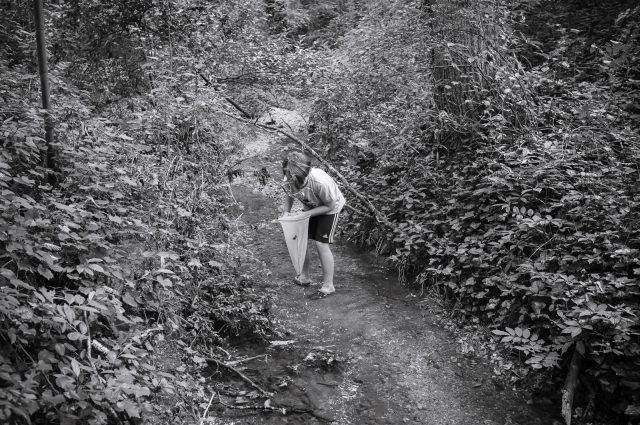
After we were both done with school, we headed down, saw and net in hand. “I still want to try to net some minnow,” he explained. We found an adequately small cane and cut it after a bit of unsuccessfully netting attempts.
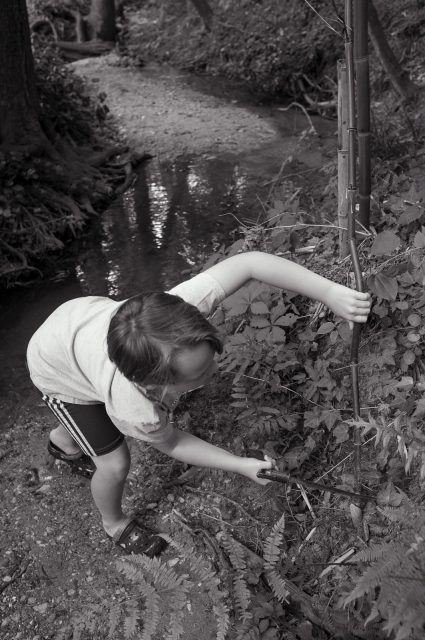
“Now we just need the line and a hook,” the Boy said as we headed back, adding as a sad afterthought, “but we don’t have any.”
“Why not ask Mr. F?” I suggested.
“Oh yeah!”
Then the real question as far as I was concerned: with Mr. F not out, he would have to go knock on the neighbors’ door, and I decided it was something he was going to have to do by himself. Would he do it?
“Just go knock on their door,” I said after he protested that Mr. F wasn’t outside at that moment.
“What if Mrs. P answers the door?”
“Just tell her that you have a favor to ask of Mr. F.”
He paused in thought. “Okay.”
When he came back, the Girl had joined us and was snooping about to figure out what was up. I explained. “Oh.” No protests about how awfully cruel it would be to catch a minnow with a hook. “With a hook!? Jabbed in its mouth?!” I could just hear her indignantly and incredulously asking.
When the Boy headed down for some fishing, I suggested that L might want to go with him. “Don’t let her talk you into letting her have the first turn because she will try to bamboozle you,” I warned.
He headed down by himself, though. I thought for a while that I should go with him at least to memorialize the moment photographically. Then I thought better of it: he needs some independence, and since he didn’t even ask me (with the explanation of being scared or worried about this or that) to go with him, I stayed behind.
He came back up a few minutes later, a scowl on his face as he stomped up the hill.
“Guess what?” he began, not waiting for a response. “I had one or two good tries and then the hook got stuck. When I tried to pull it out, the hook came off!” He plopped in a chair. “Now I can’t fish at all today!”
“Sounds like we might need to go get our own hooks,” I suggested.
More incredulity: “At the store?!” E is the most worried about cornavirus in our family. I think he’s convinced, despite our efforts to explain everything, that one can just get it, that it just lurks in the air waiting for unsuspecting victims.
In the end, we didn’t have to go get more hooks: the Boy remembered he had one small hook still on his fishing pole, so we cut it off and tied it onto the cane pole. We took some bread from a dinner roll we had, rolled it back into dough, and put it on the hook.
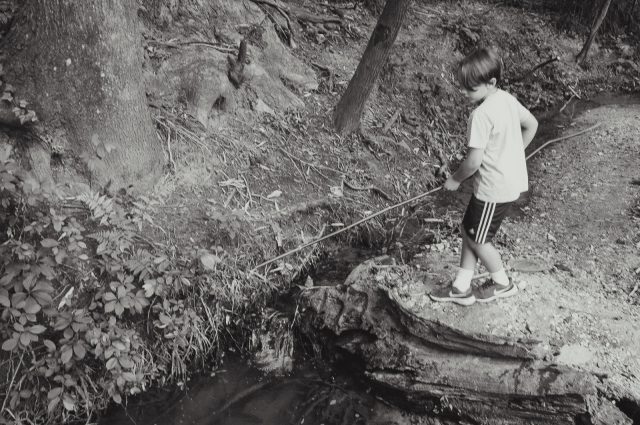
Soon enough, we had a minnow.
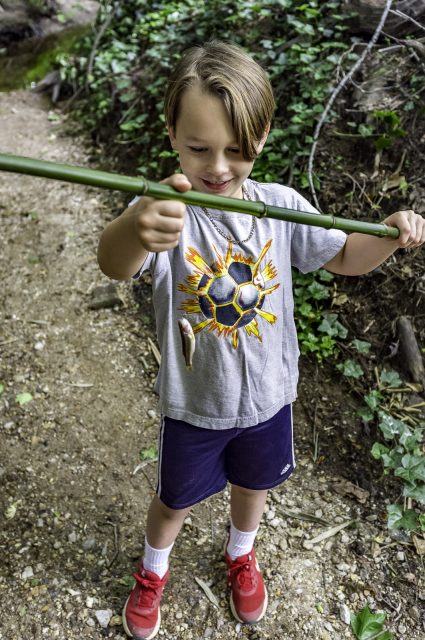
But our catch-and-release plan was thwarted by the difficulty of removing a hook from such a small fish. In the end, something terribly traumatic happened to the poor fish as we were removing the hook, and it went belly up immediately upon release.
The Companion
Clover has become a companion dog. She doesn’t wander around, looking to find what she can get into. She doesn’t sneak off to try to get on the couch. She doesn’t (always) go off searching for a toy. She plops down next to someone and just relaxes. When we’re outside and L is, for instance, in our fort reading and Papa is on the deck listening to music (he’s become a real Spotify fiend), the pup moves from person to person, spending a little time by my side, a little time by Papa’s side, and a little time with L.
Another sign that she’s no longer a puppy.
Then she goes over to the fence just to antagonize the neighbors’ dog, so many not so much…
